#黄凤凤
Explore tagged Tumblr posts
Text
The Pineapple Tart (凤梨酥/黄梨挞) is a festive staple for households in Singapore across all cultures. Traditionally, the pineapple tart took the form of an open-faced tart with a ball of pineapple jam in the centre. As more and more bakers joined the fray, the tart evolved into different shapes like round ball, pillow and even flower or animal etc...

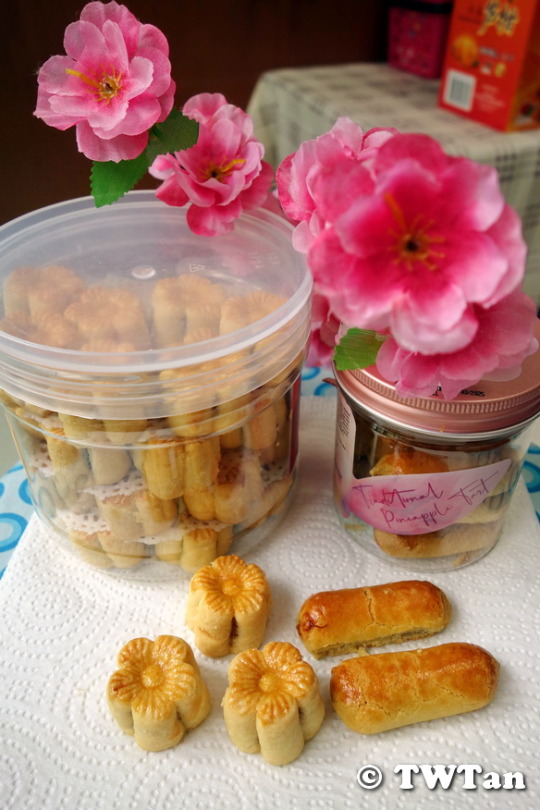
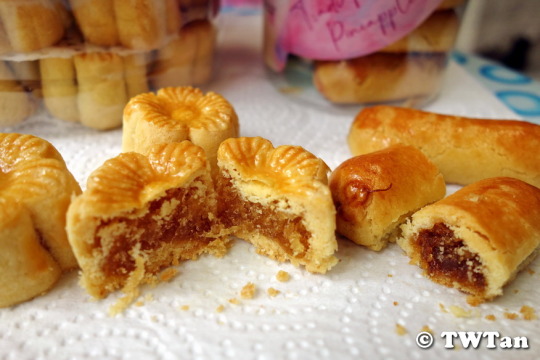
The star ingredient is the Pineapple Jam, made with painstaking effort to slowly caramelise fresh pineapple, made fragrant with the addition of tropical spices such as cinnamon, star anise, and cloves. The pastry is tender rather than crispy, and the combination of melt-in-the-mouth buttery dough with the sweet and spicy jam, has ensured it remains a traditional delight in the region.
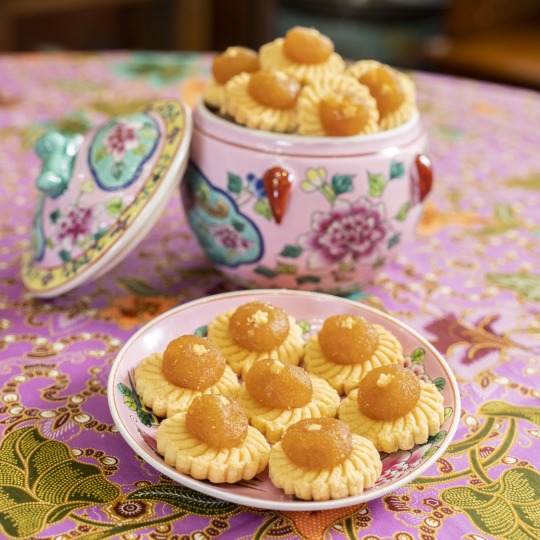
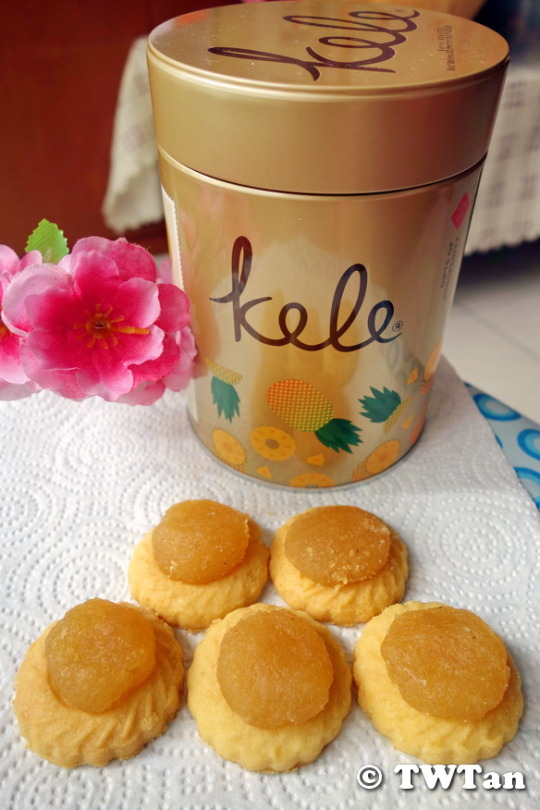
youtube
Some say the Pineapple Tart (黄梨挞) was created by the Peranakans, some say by the Eurasians, when the pineapple was first introduced to Asia by the Spaniards and Portuguese in the 16th and 17th centuries. The Portuguese were well-known for their pastries and tarts, and with the abundance of pineapples in the area, the fruit was a natural variation of jams to fill in the tarts. The use of spices originated from the cuisines of this region, resulting in the innovation of this pastry through cultural mixing.
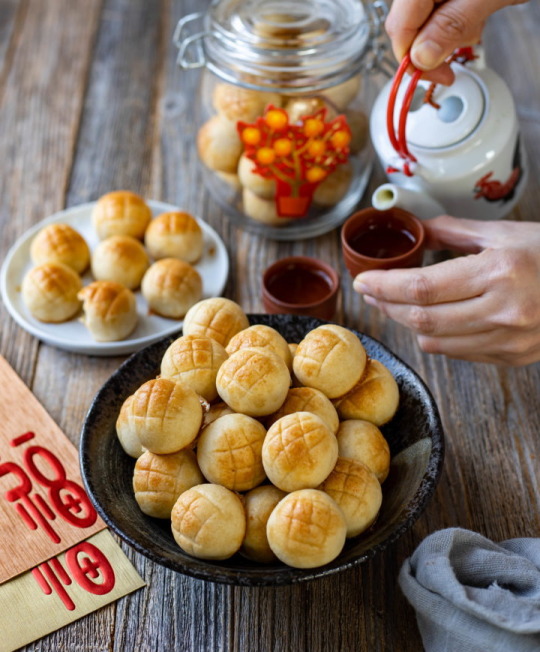
In Hokkien and Cantonese families, pineapple translates to “Ong Lai” which means “Prosperity Come”, therefore giving these tarts to your loved ones during the festive season signifies the Gift of Gold and wishes of prosperity - an added reason to enjoy one of the best loved creations to come from the exchange of ideas from the east and west.
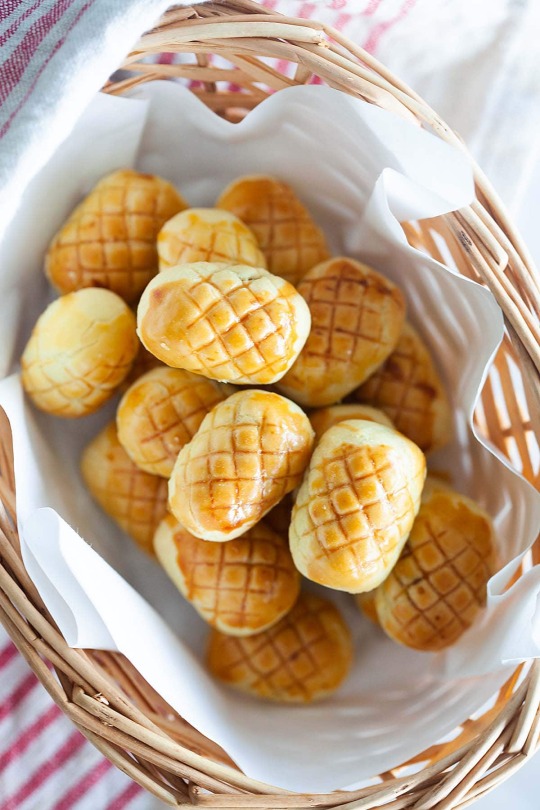
Selected images from here, here and here.
#Chinese New Year#农历新年#Lunar New Year#Pineapple Tart#黄梨挞#凤梨酥#Pineapple Jam#Pastry#Year of the Snake#蛇年#Happy New Year#新年快乐#Spring Festival#春节#2025#Chinese Festival#Chinese Culture#Youtube#Snack#Dessert#Food#Buffetlicious
146 notes
·
View notes
Text
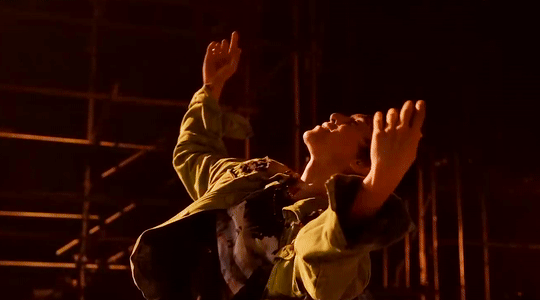
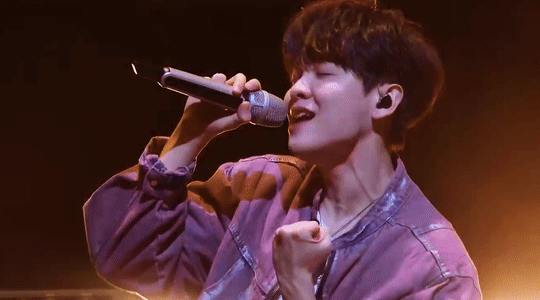

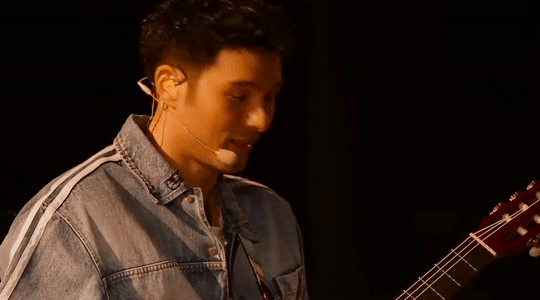
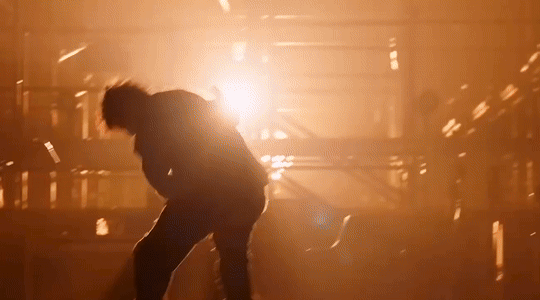
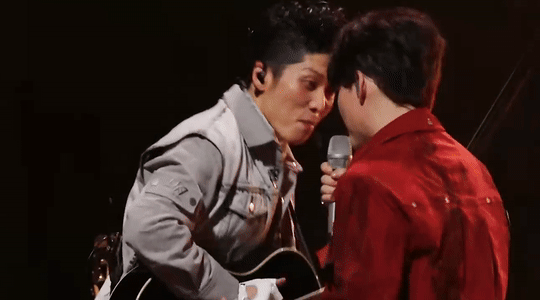
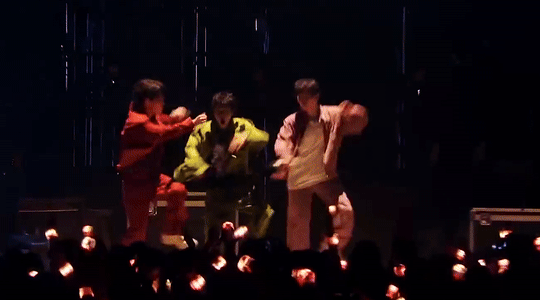

I just need a chance 要走出自己画的线 / to walk out of the lines I've drawn for myself 像自由的风筝 / Free-spirited as a kite 因为你才攀升 / Rising into the sky on your winds 认真的听我说 / Now listen closely to what I have to say 最后一次 / For the last time I'm so outta control
披荆斩棘的哥哥 CALL ME BY FIRE S4 | 二公 SECOND STAGE
《表白》 Confess (My Love to You)
#CMBF4#披荆斩棘#披荆斩棘的哥哥#尤长靖#You Zhangjing#Azora Chin#Miyavi#凤小岳#Feng Xiaoyue#Rhydian Vaughan#Zhu Xingjie#朱星杰#黄潇#Huang Xiao#cw flashing gif#cw flashing#hunxi.gif#问: how many instruments are in this piece?#答: always one more than you think there'll be!!
10 notes
·
View notes
Text
Travelogue: China - From 凤凰古城 to Shanghai
#72奇楼#China#青花旅拍#马兰头小酒馆#Langham Shanghai#Shanghai#Sulv Lianhua Hotel#Wukang Road#Zhangjiajie#凤凰古城#大無烧肉#天羁·蟹黄鱼#思南路#武康路
0 notes
Text
Before I started this show, I heard people saying LGX's kiss scene was wooden etc etc, then I watched ep30 and I was like huh, maybe a bit... Y'all could go harder heh... Then I watched ep31 and I was like oKk HoLy F what part of this is not hot as fuck 👁️👄👁️ what are all you people talking about ... 😳😳😳😳😳😳
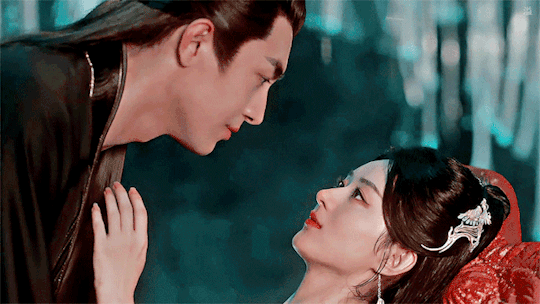
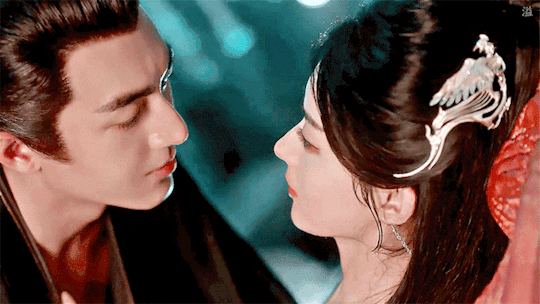
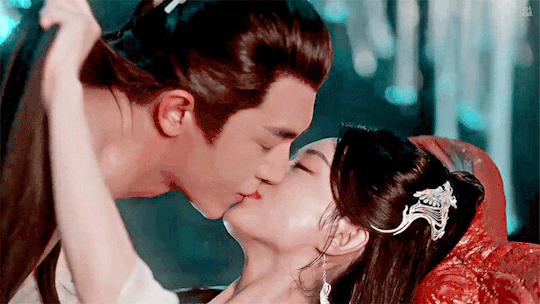
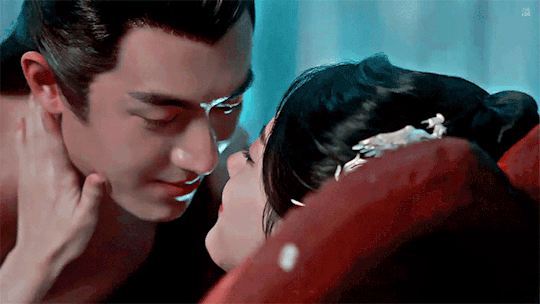



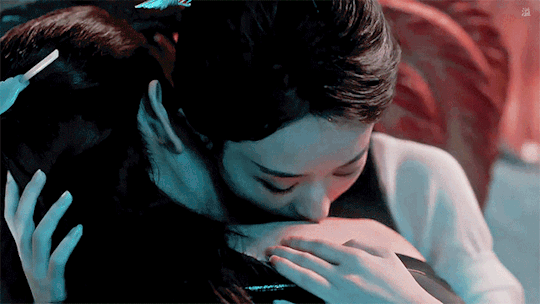
The Legend of Shen Li | 与凤行
→ 01.31
#与凤行#the legend of shen li#this feels like when i watched 梦华录... lol this is some good shet#cdrama#some good food hahaaha 林狗哪里没有张嘴我整个人瞬间被黄到了🫣
175 notes
·
View notes
Note
I was listening to 等什么君's rendition of the Southern Song dynasty poem 《钗头凤·世情薄》 (the song on spotify is just called 钗头凤), and the lyrics reminded me of an MC who had still been pining over GYX after all these years
世情薄 人情恶
(The world is cruel, people are heartless)
雨送黄昏花易落
(Rain sends dusk as the flowers fall)
晓风干 泪痕残
(The morning breeze dries my tears, but traces remain)
欲笺心事 独语斜阑
(I long to write my heart's sorrows, speaking alone by the tilted railing)
难难难 难难难
(Hard, so hard, so very hard to bear...)
人成各 今非昨
(People part, today is not yesterday)
病魂常似秋千索
(My ailing soul swings like a tethered swing)
角声寒 夜阑珊
(A cold horn blows in the deep and desolate night)
怕人寻问 咽泪装欢
(Afraid of questions, I choke back tears, feigning joy)
瞒瞒瞒 瞒瞒瞒
(Hiding, hiding, hiding...)
ooh adding this to playlist i'm trying to build, thanks! also the way this could also apply to an mc pining after qls while he's away 😭😭
#from mulberry fields the blue sea#fmftbs gaoyang xiao#i am just now realizing that majority of my cpop playlist is literally all like dancepop and r&b and like 15 ost tracks
4 notes
·
View notes
Text
long darkness — cháng yīn 长喑 translation
cháng yīn 长喑 // long darkness
a fan-made song on Xiao Jingyan. I have always been a Mei Changsu over XJY person, but this song from his pov really worked for me and let me see the weightedness of XJY's crown, so I wanted to share it with more.
song link in comment below. (bilibili . com / video / av10441457/)

长剑出鞘冷锋芒 十三载意难忘
缓歌曼舞九重宫 朔风黄沙麾旗扬
手足血脉埋青冢 挚友良弓唯锈藏
岂能折腰屈膝没忠良
the long sword unsheathes from the scabbard, its cool blade revealed. thirteen years, and hard it is to forget.
leisured, soothing melodies with graceful dances at the ninefold palace; north wind and yellow sand with the billowing ensign in the desert. *[1]
brothers-in-arms and brothers in blood in tombs buried, graves long covered in grass; dear friends and cherished bow stored away, now left only to rust —
how is one to bend and kneel, and bury the names of the honourable and the good?
挑灯不眠千军帐 逐千里护家邦
玉壶冰心铁骨铮 扬眉冷看覆风浪
当时少年且横枪 凝尽碧血守四方
守国土河山定国安邦
light a lamp through the unrested nights at the commander’s tent; repel foes a thousand miles, and shield the kingdom.
nobility and aspirations stayed true to, bones of steel resounding. head high, brows lifted, he coolly looks to the tempestuous, overturning storms. *[2]
the youth of the past still danced their spears: blood of the honourable, thoroughly consecrated, defends the four corners of their homeland,
guarding rivers and hills to secure peace of the kingdom’s earth.
(念白:我不要求你能理解,什么是军人铁血,什么是战场狼烟,但有些人,不能伤害,有些事,不能利用。如果连那些血战沙场的将士都不懂得尊重,我萧景琰绝不与你为伍,清楚了吗?)
V/O — I do not expect you to understand a soldier’s honour or the smoke signals on the battlefield. But there are some people you cannot hurt, some things you cannot manipulate. If you cannot even respect the soldiers dying at the battlefront, I, Xiao Jingyan, will never work with you. Do you understand?
铁马金戈谈笑并辔封疆 几回魂梦
凤阙深深夜雨潇潇数闻铃
鸿儒谈笑对面不知相逢 唯知君臣纲
音容早已远谁知苍凉
armoured horses and metal spears, riding in parallel in friendly chatters at the borderlands — how many times has the soul dreamt thus?
depths of the palace, whistling of the nightly rain, a few stray rings of the bells. *[3]
an erudite scholar, now sat opposite in small smiles converse, yet know not to reunite. what leaves is the etiquette of lords and lieges. *[4]
voice and countenance long since distanced — who is to know the desolation and vicissitudes concealed?
谈笑自若朝堂对气轩昂 霁月风光
风云激荡历艰辛终执牙璋
漫漫更鼓朱笔落夜未央 提笔写兴亡
四顾怅惘余音且绕梁
composed in dialogue and pleasantries, assured and imposing at court. he is noble and virtuous as the bright moon and warm breeze.
wading through the unpredictable winds and turmoils, zhang sceptre of jade at last in hand.
drums signifying the night hours sound, red comments from the emperor’s brush move through the boundless night yet to end. a lift of the brush, and prosperities and declines are writ. *[5]
pensive and lost he looks to four sides. remnants of past sounds remain, resonating through the beams of the palace.
(verse 2)
潜龙在渊敛锋芒 风雷动引龙翔
风云际会参参商 瞰天下世道无常
掌中龙渊凛如霜 立丹陛守盛世长
祭酒未凉叹谁人共觞
like a submerged dragon in the abyss, he enshrouds his splendour. wind and thunder call his wings to flight. *[6]
in the winds and clouds, he engages in the tumult of the Shen and Shang constellations. from above he looks down at the fickleness of the world.
in his hands, the abyss of the dragon is cold as frost; he stands at the red stairway before the imperial palace, and overlooks an everlasting prosperity.
the wine offering to the dead is yet to cool — I sigh, who is to drink with me?
袖手天下为帝王 垂衣且驭八荒
气宇舒金殿垂拱 揽尽山河只手倾
长歌挽弓射天狼 潜龙一朝御风翔
乾坤日月昭天下清朗
hands folded in sleeves, he gazes at the kingdom before him. as emperor he rules from his attire and directs even the most distant lands. *[7]
with poised air he commands the court, hands held together; the entirety of the kingdom shifts with a tilt of his hand. *[7]
sing high and long; draw your bow to the invading Sirius. the submerged dragon one morn rises to ride the winds. *[8]
heaven and earth, and sun and moon clears, and the world before brightens.
铁马金戈谈笑并辔封疆 几回魂梦
凤阙深深夜雨潇潇数闻铃
鸿儒谈笑对面不知相逢 唯知君臣纲
音容已故徒一身沧桑
armoured horses and metal spears, riding in parallel in friendly chatters at the borderlands — how many times has the soul dreamt thus?
depths of the palace, whistling of the nightly rain, a few stray rings of the bells. *[3]
an erudite scholar, now sat opposite in small smiles converse, yet know not to reunite. what leaves is the etiquette of lords and lieges. *[4]
voice and countenance already bygone, all but a body of desolation remains.
谈笑自若朝堂对气轩昂 霁月风光
风云激荡历艰辛终执牙璋
漫漫更鼓朱笔落夜未央 提笔写兴亡
从此立龙城孤守八方
composed in dialogue and pleasantries, assured and imposing at court. he is noble and virtuous as the bright moon and warm breeze.
having waded through the unpredictable winds and turmoils, zhang sceptre of jade at last in hand.
drums signifying the night hours sound, red comments from the emperor’s brush move through the boundless night yet to end. a lift of the brush, and prosperities and declines are writ. *[5]
from forth he establishes himself in the imperial city of dragons. alone, he awatches the eight corners of his realm. *[9]

Extra notes
for those keen on classical chinese and literature allusions
I’ve cited some allusions and references I was reminded of as I listened to the song. These are subjective, my knowledge of classical texts is very limited, take everything with a grain of salt and please do comment if you’d like to supplement any information.
[1] 缓歌曼舞九重宫 朔风黄沙麾旗扬 — 《长恨歌》 白居易 The Song of Everlasting Regret, by Bai Juyi
缓歌曼舞: from “缓歌慢舞凝丝竹”. This is at the start of the romance tale, where the palace is in carefree bliss and prosperity.
slow and graceful songs / slow dances / slowly the music of the strings and the bamboo reverberate in step with the dances.
朔风黄沙麾旗扬: might be a stretch; I was reminded of “黄埃散漫风萧索”. This is from the same poem as above, we are one fourth in here, and it talks of a war.
yellow dust, scattered, drifts through the air. the bleak wind howls.
[2] 玉壶冰心铁骨铮 — 《芙蓉楼送辛渐》 王昌龄 Bidding Xin Jian farewell at Furong Tower by Wang Changling
玉壶冰心: from “洛阳亲友如相问,一片冰心在玉壶”
if the relatives and friends from Luoyang ask, tell them that my noble intentions are unchanged; a heart of ice in the vase of jade.
[3] 凤阙深深夜雨潇潇数闻铃 — 《长恨歌》 白居易 The Song of Everlasting Regret, by Bai Juyi
夜雨潇潇数闻铃: again could be a stretch; I was reminded of “夜雨闻铃肠断声” from the same poem as [1]. (don’t ask me why, this entire song is infused with this piece it feels). This talks of the same romance tale, in which the emperor mourns the death of his beloved.
in the nightly rain, the sound of the bells could be heard. it sounds as sorrowful and agonising as the breaking of intestines.
[4] 鸿儒谈笑对面不知相逢 唯知君臣纲 — 《陋室铭》 刘禹锡 An Inscription of the Humble Abode by Liu Yuxi; 《江城子》 苏轼 Jiang Cheng Zi, by Su Shi
鸿儒谈笑: from "谈笑有鸿儒,往来无白丁" credits to @fwoopersongs because my brain happily omitted it!
well-learnt scholars congregate in joyous talk, traversing there is no uncouth and unread.
不知相逢: there are many poems on this topic, one of the most notable ones would be “纵使相逢应不识,尘满面,鬓如霜。”
even if we met (Su Shi and his deceased wife), you should not be able to recognise me. dust covers my face, and the hair of my temples is white as frost.
[5] 漫漫更鼓朱笔落夜未央 — 《长恨歌》 白居易 The Song of Everlasting Regret, by Bai Juyi (added in edit)
漫漫更鼓: Okay, "迟迟钟鼓初长夜" immediately came to mind when I saw this phrase, but I went like here's too many footnotes already and thought it was too much of a stretch to put in (there's only one word in common!). Then I looked into the original poem, in which the timely bi-hour rings of the drum felt lengthened because of the emperor's agony over losing his loved one -- and so I went like, okay, this is relevant, I actually need to add this in.
the drums reporting the hour of the night come late, and it is early in the long night.
漫漫 meaning endless, without an end in sight. This echoes the sentiments of the emperor in Bai Juyi's poem in feeling that the night is everlasting and without end.
[6] 潜龙在渊敛锋芒 — 《易经》 Yi Jing, the Book of Changes
潜龙: There’s an awful lot of “submerged dragon” metaphors in this stanza. Technically it's a figurative "talents hidden dragon" rather than literally, under the waters. This is from Yi Jing essentially, a super old book on divination that does have some wisdom of old sayings in it. The submerged dragon talks of how the dragon, currently veiled, is a powerful being simply not revealed to worldly eyes yet, and is waiting for opportunity to strike (more like, soar, in this context). These lyrics parallel Xiao Jingyan with the allusion to talk about how he stayed silent for thirteen years before his time of brilliance.
[7] 袖手天下为帝王 垂衣且驭八荒 / 气宇舒金殿垂拱 揽尽山河只手倾 — Taoism concept
Okie this is super complicated and involves a Taoism context, some history from the beginning emperors of the Han dynasty, and a very enthusiastic Emperor Taizong of Tang; I don’t really know how to go about this.
袖手, 垂衣驭八荒, 垂拱, these all lead to the same concept, and the middle chunk in particular is from a poem written by Emperor Taizong of Tang. Theory suggested by Laozi and Zhuangzi of Taoism, overall it talks of inaction, which is action the emperors at the start of the Han dynasty employed. They demanded less of their citizens and let the economy recover naturally (agriculture and such), and since these policies worked, the starting few Han emperors were regarded highly with this kind of purposeful and benevolent “inaction”.
In short, this song here uses these descriptions to talk of Jingyan as a competent and masterful leader.
[8] 长歌挽弓射天狼 — 《江城子·密州出猎》 苏轼 Hunting outside Mizhou (yet another Jiang Cheng Zi), by Su Shi
挽弓射天狼: from “会挽雕弓如满月,西北望,射天狼。”
I shall draw my carved bow like the full-moon, point towards the northwest, and shoot in the direction of the intruders.
天狼 means Sirius star. In chinese astronomy/astrology it was somewhat related to evilness, hence the use of Sirius to denote intruders.
[9] 从此立龙城孤守八方
I just added this this is not a reference it just really reminds me of this fanfiction oneshot 此生一诺 (this life, a pledge)! It talks about XJY at the end of everything, he draws a circle about the ground and entraps himself with the promise he made to see the world a better place under his reign (from the chinese idiom 画地为牢). I recced the oneshot here if you wish to check it out.

arghhh the entire course of me writing the tl was me going oh goodness why is there yet another footnote but I’m glad to be done for now.
Like, goodness. There is not one “he” or “him” reference in the lyrics. I would love to do the same, but you can see me getting more and more resigned towards the end of the translation.
I am sooo inclined to passive voice and invert subjects for every sentence when it comes to translations, I realise, and I apologise for the almost-signature abundance of semicolons and em dashes in the translation (I blame it on the difference in punctuation nuances. — I subconsciously use semicolons for semi-parallel sentence structures, so you can spot out imperfect couplets that way.) Massive respect to all those who translate, because easy is it to hatch out a crude translation in five minutes, it is not treading about the delicate balance between literal and metaphorical, and in all honesty I feel that it is just way easier for me to write literal once, then go off the rails and do super-figurative for the other.
There are far more annotations and word definitions I’d like to add (I could literally do a classical text/poetry meta for every word lmao), but evidently, time constraints, and truthfully it would take forever to complete, so on a “ask me and I’ll try to elaborate” basis again.
The V/O — I’d love to make it more archaic, but the dialogue from the drama in this part was so modern apologies I’m sort of disappointed with the translation over here.
Re: song title. Yes, it sounds a little weird, excuse that.
I considered other translations for the song title, but none of them really gave the impression I really wanted. Words like “eternal” and “everlasting” were too permanent, I wanted to express the idea of the darkness being lengthened, yet with Jingyan’s reign it would come to an end, hence my hesitance. “Continual” is one I fiddled with: it did not give the same curt, direct feeling as “long” however, so in the end I just ended up with the simplest title.
Update: click here for notes on the amendment of the title.
#nirvana in fire#琅琊榜#nif#lyb#lang ya bang#xiao jingyan#chinese translation#chinese language#cdrama#chinese#literary chinese#classical chinese poetry#fate translates#fate creates
44 notes
·
View notes
Text
青玉案 · 元夕 - 辛弃疾 english translation (and notes!)
ok well. all this chinese poetry posting has put me on a bit of a translation high so i wanted to share my most recent translation project, which i actually just finished recording and uploading yesterday after two whole months of waffling. the poem itself is SO fucking cute but SO hard to translate and i'm honestly very proud that i stuck with it to the end. it instantly became one of my top favourites the very first time i heard it so i hope other people can also find some joy from it!
here is the original:
青玉案 · 元夕
【宋】 辛弃疾
东风夜放花千树,更吹落、星如雨。宝马雕车香满路。凤箫声动,玉壶光转,一夜鱼龙舞。
蛾儿雪柳黄金缕,笑语盈盈暗香去。众里寻他千百度,蓦然回首,那人却在 灯火阑珊处。
and here is my translation:
Qing Yu An: Lantern Festival at Dusk
by Xin Qiji
Fireworks blossom beneath the touch of evening's eastern breeze; flurrying as they fall, sparks shower like stars. Prancing steeds pull chiseled carriages, sweeping fragrance across the path. The xiao’s decadent notes adrift, the jadelike light’s prismatic shift; the dragon-fish dance as the night-hours pass.
Combs shining in their hair, golden, silver, silken sway; sweet perfume and tinkling mirth linger in their wake. My searching gaze is futile as I scan the thronging crowds; at last I turn, and you are there, in the quiet dark of evening wane.
translation notes beneath the cut! there is a LOT, be warned!
translation notes:
so to start from the very top, let's first introduce the title 青玉案 · 元夕.
青玉案 (pinyin: Qing Yu An, lit. the matter of the verdant jade) is actually the name of a 宋词排名 (song cipaiming, song dynasty poetic/musical form). just as shakespeare wrote sonnets and basho wrote haiku, so the poets of the song dynasty wrote, among hundreds of other forms with fun names like this, Qing Yu An poems.
each 词排名 had a set number of characters per line, set rules for its tone patterns, and even came with its own tune. maybe a better western parallel would be twinkle twinkle little star, which uses the same tune as the alphabet song and baa baa black sheep.
the end result is that there are many titles under the heading of Qing Yu An, and even, according to chatgpt, another 青玉案 · 元夕.
anyway, this one by Xin Qiji, the most famous one, is titled 元夕 (yuanxi); 元 refers to 元宵节 (yuanxiaojie), the lantern festival held on the fifteenth day of the lunar new year which marks the end of the spring festival/chinese new year, and 夕 is dusk. hence a very naturally poetic name, lantern festival at dusk.
before i get into the text of the poem, i want to note that i often sacrifice rhythm/rhyme for precision of meaning. i ✨artistically✨ speed up/slow down some syllables while recording to preserve some sense of metre lol, but it does read quite awkwardly on paper. i'm a very inexpert student and have a lot to improve on!
ok so! line by line!
东风夜放花千树
--is a literally genius pun. it transliterates as: the east wind in the evening blows open the flowers of a thousand trees. very spring, right? haha spring festival get it.
however! its a chinese celebration, so what will there definitely be? fireworks 😎 and it just so happens that one word for "setting off fireworks" in chinese is 放烟花 (fang yanhua). yep, that's the same 花, which means flowers, but when combined with 烟 (smoke), it becomes a "fire-flower" 🎆!!
it's also the same 放, which in the context of actual flowers means the opening of petals, but in the phrase 放烟花 means to set off (the fireworks).
together, this line evokes both the blooming of the spring flowers under the eastern breeze* and the blooming of a thousand fireworks in the evening sky.
*spring comes from the east ofc; this is folklore and not science i think but lends to the spring-ness of the line
更吹落,星如雨
this one is pretty straightforward. lit. blown through the air by aforementioned wind, falling like a rain shower of stars.
宝马雕车香满路
oh boy. when i tell you my mom (who is my chinese teacher) and i got in several petty arguments over baomadiaoche...
so 宝马 (baoma) are just well-bred horses, prize steeds with a pedigree. a 雕车 (diaoche) (lit. carved chariot) is a very expensive carriage carved with lots of intricate decorations. in other words, these ppl are RICH.
however, it was difficult to convey the sheer decadence of 宝马雕车 without either using a miles worth of syllables or entirely losing the original cultural context. carved was too direct and ugly to hear besides, etched was not elite enough, sculpted conveyed entirely the wrong image... also, for some reason, "proud" to describe steeds was vetoed for being inaccurate???? hence the arguments.
in this scenario, the final word choice really is a matter of the least bad option.
at the same time, the second half of this line 香满路 (lit. fragrance fills the path) implies movement: the carriage is passing by, leaving the fragrance of rich people perfume in its wake. for the sake of syllables, i shifted that movement to the fragrance part of this line. i also like that this evokes a high-headed noble sweeping elegantly through the crowds.
overall, this line adds to the picture of a decadent, bustling market street during the most joyous celebration of the year.
凤箫声动,玉壶光转,一夜鱼龙舞
lit. the notes of the phoenix xiao (chinese recorder) move, jade gourd light shimmers, the fish dragons dance all night.
chinese ppl, ok, use two motifs to describe the beauty and virtue of every artistic thing ever: phoenix and jade. phoenix xiao means NOTHING. it's like virtuous xiao. jade gourd is a little harder; some say it's the moon, some say it's the lanterns. jade and light put together kinda implies moon anyway, so i just sidestepped the problem entirely.
as for 鱼龙 (lit. fish dragons), theyre a type of dragon lantern which supposedly has some characteristic of a fish. they are puppet-danced on sticks - dragon dancing, the classic. my mom and i both had a vivid image of this dragon-lantern-dancing, but we couldn't find it ANYWHERE. if anyone knows the right search query to pull this up, please lmk how to tame 谷大哥*. anyway, i left the lanterns implied because idk how the fuck to explain this whole thing in four syllables.
*lit. big bro google. its funnier in chinese
蛾儿雪柳黄金缕
this is the line that, when i finally bothered to properly research it, made everything about this translation click into place. these are all hair decorations. 蛾儿 (lit. li'l moth) are silk moths, 雪柳 (lit. snow willow) are silver tassels, and 黄金缕 (lit. yellow-golden cords) are gold cords lmao. hence golden silver silken sway, which was SO satisfying to come up with.
笑语盈盈暗香去
lit. laughing speech tinkles and faint fragrance goes by. this one is also fairly straightforward. 去 means to go, so we specifically want the image of a group of giggly teenage girls fading into the crowd.
众里寻他千百度。蓦然回首,那人却在 灯火阑珊处。
and finally we reach the most famous line, the 千古名句 (qiangumingju) - iconic line of a thousand histories!
lit. within the crowd, searching for him* in a thousand hundred directions; suddenly the head turns, it turns out that person is standing in the darkness where the lights have gone out.
*"him" is highly debated. 他, used in modern chinese like the pronoun "he", was historically a catchall pronoun for people of any gender. iirc, 她 for "she", and the gendered distinction, was only introduced when china started integrating to the west. in this line, 他 could be the teen girl that just passed by, or her beau. whichever way, one is the searcher, the other is the searched. i chose here to sidestep this by using i and you bc fuck gender.
anyway, when the searcher's head turns - even this bit had to be suitably poetic, a nightmare - they find their lover in the 灯火阑珊处.
灯火阑珊处 this phrase refers to a very specific image. imagine, in the early hours of the morning, a dwindling market street; the stands are closing one by one, lights winking out, leaving a gentle blanket of dark and calm behind. it is the quiet after the rain, the breath after the shout; it is the sigh of closing your front door at the end of the night. it's not the absence or complete lack of light, but rather the exit of it. a place of that just-left-behind dark is a 灯火阑珊处.
this sentence gave me so much grief and i am so proud to have done it even just a little bit of justice.
so after all that, the scene described by this poem is something like this: a lively late-night market street. people from many walks of life fill the path, celebrating the lantern festival, the turn of a new year and coming of spring, a riotous party of light and noise and joy. as the night slips into the sixteenth, the market begins winding down, stalls closing and lights winking out. amongst the teeming crowds ambling their way home, a young person searches for the their lover from whom they were separated; on some sudden instinct, they turn, to find their lover already looking back from the darkness of the fading festival, gaze caught in the divide between light and dark, wake and sleep: a quiet young love on the edge of spring, something fresh and new.
if anyone made it to this point, thank you and i hope this was an interesting read! please feel free to add comments questions and observations!! i would love to discuss at any level with someone other than my mom and chinese poetry truly is one of my passions even when it makes me want to kill, so i'm always down to talk. :] <3
#mine#fuck yeah chinese poetry#count how many times i used a thousand in this post#why do we love our thousands... ancestors... have a little imagination...#chinese poem#chinese history#mom if you see this im sorry & i love you very much & im very very thankful you cultivated this passion in me mwah mwah
31 notes
·
View notes
Text
一起挤出来吧
我大二时很穷,因为我家里没什么钱能供孩子读大学。所幸那年夏天,包叔给我一个在他牧场打工的机会,供食宿而且一个月七千元,真是一个不错的机会!虽然我完全不了解牧场的状况,但我仍很愿意去尝试这种乡村生活。
包叔有两个十来岁的儿子,以及一个叫阿柏的雇工,我们五个人必须照顾三百多头乳牛,也就是说,假如一个人完全不瞭牧场生活,那么他将完全帮不上忙。因此头三天我只能作将肥料搬出仓库的活儿,虽然它不大有趣,不过这也是一个不错的方法来代替我平时的健身习惯。
第四天清晨四点,阿柏叫我起床,说要让我见识见识挤牛奶;毕竟这将是我每天的必行任务。在搬了三天的肥料后,我相信不管什么其它工作一定都会比不断搬东西好的多了,即使我接下来必须每天一大清早就起床挤奶。
阿柏介绍我一只黄毛的老母牛,「她叫金凤,她害怕挤奶器,所以我们必须用手挤它的奶。你知道我有多想把它放走吗?只不过它是你叔叔养的第一只乳牛,又加上它乳汁产量很多,真是!」阿柏将板凳和牛奶桶放定位,坐下说:「靠近一点,要看清楚啊。」
我靠近他出神地看他用手抓着乳牛的一个乳房,再稳稳地轻轻地一挤,「看懂我怎么做的了吧?」
「啊!最好再示范一次吧!」
「好,再看一次。」他两只手各抓一个乳房,并用着稳定的速度挤着牛奶。
我知道此时我应该看着他的手才是,但站着的我却看尽他的前胸。阿柏是一个有着黑发与橄榄色皮肤的酷帅男子,他拥有健康的肌肉与那露在只扣一个扣子的衬衫外的浓密胸毛,此外,裤裆那膨胀部位更是他的珍贵财产。
我发现阿柏很是喜欢穿衬衫却又总是只扣最下方那颗扣子,让人觉得他身上的衣服随时会掉下来一样。他又只穿最大size的衬衫,所以当他走路或干嘛时,我都会偷偷瞄他那紧绷的小腹和有弹性的胸肌。他又常穿那件破了许多洞的牛仔裤!乡村生活对穿衣总是不太讲究,不过我相信他裤子上的那些洞多少是有功能的。他裤子上有一道裂缝竟让我毫无阻碍地看到他那没穿内裤的屁股。唉!其实最让人感到痛苦的是我和他同住一间房,每次当他裸睡时,我会觉得若不到他那张床上我就会疯掉!
突然我发现,当我正在幻想着阿柏的时候,他竟瞪着我,等待我回答他的问题。
「唉~你刚问我什么呀?」
他露齿轻轻笑了笑,不知怎的我竟无法辨别这笑容代表什么。
「我说,你想不想试试看啊?」
「啊!好啊!」于是我们交换位置,我坐下来,而他站在我侧后方,他的胯部只距离我的脸几公分而已。「快试呀!」他催促着。
我现在应该作的,其实是靠到他身上并用脸颊摩擦着他的胯部,嗅着那男性气味并轻咬他胯下隆起的部位,让口水湿润他那件已褪色的裤子,品尝他的男性。
不过我仍压下这股欲望,毕竟我不能失去赚取学费的机会,此外,至今阿柏对我所放的饵都还没作出任何反应,我必须得到他友善微笑之外的东西。
我将注意力转回乳牛身上,在它的乳房用力挤着牛奶。
阿柏看出我的困难,用肘推了推我说:「你才第一次挤牛奶就能这样已经不错了!剩下的我来挤。」他坐上凳子有效率地挤着。我专心地欣赏着他的手,多么希望他的手是在我身上工作!总比挤那只身在福中不知福的神经质老母牛好多了!
保尔将牛奶桶放入冰箱,告诉我:「现在我教你挤其它乳牛的奶。」
那实在是太简单的工作了!多亏包叔有先进的挤奶机器,因此我只需把乳牛的乳房接在机器上就可以了。
接下来我只需在牛群间看挤奶器有没故障,并在牛的乳汁快挤光时给予按摩,看看奶是不是已经挤完。这工作实在是太简单了,简单到会让人觉得厌烦!我有太多时间在剩下的挤奶管上研究着,我想,会有谁不想「接上」挤奶管呢?当我想到这,我的老二逐渐变硬。挤奶管并不粗,不过我的老二也没多粗呀。我觉得我可以先涂上凡士���,再将半硬的屌接上挤奶管。我瞄了一下阿柏,他正在牵牛,偷偷望着他那破烂牛仔裤下的浑圆屁股,我总需要一些发泄啊,尤其是那欲望所造成地狱般的痛苦。于是我决定今晚要偷偷下来试试,我一边磨擦着牛仔裤里不安份的老二,一边作着打算。
突然阿柏爆出一声大笑,我转过头去看到他正看着我,我一手拿着挤奶管,一手抚搓着裤裆的样子。「我打赌我知道你在想什么!」他大声地说,我整个脸通红,他转过身去也没再说些什么。
因为三百多头牛都必须挤奶,所以我们中午直接就在牛栏中休息,此外,有些牛每天还得挤两次咧。当晚餐准备好时,我已经累得半死,晚餐后婉拒了包叔提议玩的朴克牌,就拖着累坏了的身子回阁楼去。这是一间没啥家具的房间,除了两张床和一张桌子外;不过,从这间房间倒可以欣赏到非常棒的农场景色。
上了床,就和平时一样,在阿柏趴着爬上床时,欣赏着他的臀部。我是多么希望能看看他的老二啊,但他这种上床方式都让我无法开眼界。他的屁股很可爱;又小又紧,还有肌肉形成的凹陷。天!看起来多棒啊!但光只是看却又是多么无聊,今晚,我另有打算。
在他上床后,我躺了半个小时,等阿柏睡熟后,我只穿着牛仔裤下楼去,借着月光到牛栏中找挤奶管。我先堵住同一部机器中的其它挤奶管,好让我要用的那根有更强的吸力,然后在我的老二涂上凡士林,再接到挤奶管上。但我的屌太硬而挤奶管又不够粗,我决定要让屌软点,我想些别的事,甚至看窗外,试着以分心来让它软下来。
突然牛栏这边的灯亮了起来,天啊,该不会是包叔以为我是小偷吧。他一定带着枪和家人一起过来,而他们将看到我试着将挤奶管套到老二上,我完全不敢回头去看到底是谁,直到我听到阿柏的笑声。
我转过去看他,他站在那看了我手上的机器一眼,「瑞迪,不要试这东西啦。」他穿着那件有破洞的牛仔裤和一件花衬衫(当然还是只扣一颗扣子!),顽皮地笑着。「别用这机器!」他又说了一遍。
「什么?…我…我只是…」我咕哝地。
「我知道,我知道,」他说,「你并不是第一个有这种想法的人。」阿柏走向我,他的眼睛没有离开我的老二,我的老二在他的注视之下又硬了起来,「我也试过要玩这东西啊,不过这太细了,野兽般的屌是插不进去的,瑞迪,你的有几寸?」
「九寸。」我回答他。我那根石头般的硬屌和他的眼光交会着。我试着控制我的呼吸,但仍像只赛马一样喘着,我的胸膛正随着我的欲望起伏。
「我知道,你有割包皮。」阿柏更靠近我,「我喜欢割过包皮的屌,它们看起来比较美。」他的眼神把我像囚犯般地锁了起来。我感觉到他的手包围着我那油腻的硬屌。
「要知道即使你的老二塞进了挤奶管,机器也无法作用,结果就不能让你享受打枪了。」他轻轻地上下搓着我那肉棒,「我这样才是你想要的,不是吗?」
他的眼着火般,在那眼中的烈焰与他那工人的粗糙手掌中,我完全迷失了,我闭上眼睛,呻吟着叫着好。
阿柏站到我的身后,一只手仍在我的硬屌上抽送着,另一只手则在我的乳头上作着轻柔的圆周运动。而他那坚硬的下体也在我的臀部上磨擦着,他轻咬着我的耳朵,同时轻声地强调着:「这不正是你所想要的吗?」
「嗯….」我呻吟着,并把头躺在他的肩上,他的肩膀是如此的宽厚坚硬啊。他的舌头伸入我的耳中,我喘息着把头转过去,将他那饥渴的双唇贴到我的嘴上,缓缓地,我们互相享受着对方的舌头。
「瑞迪,自从你来那天,我就想让你上我的床了,没想到我们竟浪费了这么多天的时间。」
「别难过,阿柏,」我转过身拥着他说:「我会让你想要的都在今夜成真。」我紧抱着他并深深地与他热吻着,我的手也在他那雄壮的胸膛上游走着。我感到他紧绷着肌肉,「怎么啦?」
「这灯还亮着,你叔叔还在等我回去通报哩。」他回答
「喔!那我们该怎么办?」
「我们得回楼上。」他说:「我会小心的。你现在应该还在床上还在熟睡!懂吗?」
「嗯!」我以最快的速度爬回到阁楼,听着楼下的动静,只听到阿柏将牛栏门关起来并向包叔回报没有小偷。
不久阿柏就回到我们阁楼上的房间,脱去他的衬衫并在月光下露出他那我最喜欢的笑容,「现在,我们该作什么?」
我笑着将我身上的衣物全脱光,在他面前展现我的裸裎,说:「我们应找回前几天所失去的时光。」
「对!」他褪去裤子,那野兽般的巨根昂然竖立。
「你的有多长啊?」我渴望地问。
「八寸。」
也许他的老二真的只有八寸而已,但看起来总不像这么回事,它很大,真的是大而粗,是一根有我的老二勃起时两倍粗的包皮粗屌。
「你是怎么将你的粗屌塞进挤奶管中呢?」我很好奇地问。
「我骗你的。」他一边说一边和我爬上床,「我知道我的」缺陷」。」同时他将他的屌调到比较舒服的位置「我还没遇过一个能够好好掌握我这根大屌的男人。」
我们开始狂吻,他爬到我的身上,调弄着我们俩的巨大老二,他温热的舌裹着我的舌,而他那钢铁般直硬的阳具则在我的跨下磨蹭。我将手脚紧紧紧紧地缠绕着他的身体,几乎想将他抱进我的身体。
「喔~天啊~阿柏~干我~」在不断的吻中,只要嘴巴一有空档我便这样求着他。
「嘿!已经润滑过的是你那根耶!」一边说,阿柏一边跨坐到我身上,以轻柔、熟练的动作将我的屌送入他的屁眼。他屁股的肌肉慢慢地动作着,直到我的睾丸碰到他的臀部,这是我享受过最棒的感觉。他挺直上身并开始上下地用肛门吞吐我的老二。
「喔~耶~享受我的屌吧~享受我又硬又粗的巨棒吧~」我一边享受着他那规律的摆动,一边叫着。我知道我再也不用对这个饥渴的农场工人表现任何矫饰的绅士态度了。
我伸出双手,抓住阿柏的两个乳头,重捏轻揉地让它们变硬。「哦~爽啊~」他呻吟着,同时也向我的奶头抓来。当他这样稍微弯身取悦我上半身的同时,我便感到下半身的主宰深深地插到他的最深处。
我将我们俩翻过来,使着最大的力气抽插着他的洞口。他爽到将腿夹着我的臀,两个脚板也紧紧贴在我的膝后。阿柏也乘着这姿势,在我每次奋力插入时将我推得更进去。我抓起他的屌,但他却把我的手推掉,「不~不!」他一边呻吟着一边说:「我不想在你的手中射,答应我,等一下你会让我进入你。」
我放开他那诱人大鸟,转而开始吻他,随着干着他那一下又一下的激爽。阿柏用力地吸吮着我的嘴,我感到只能由鼻子进出的空气实在不足,痛苦地放开他后,用力的吸着气,随着新鲜空气的进入,我达到前所未有的高潮。
「我要射了~阿~~阿~柏~我要射了~我~哦~~」我将一大滩的精液射进他的体内,我全身只能意识到不可思议的爽,与阿柏那紧绷扭着的屁眼。我的脸埋在他的胸膛,感受那似乎快要窒息的感觉,同时尝着他身上狂泻而出的咸咸汗水。
在我们的活塞运动慢慢减速时,阿柏突然将腰和臀部用力挺起,他也喷射出来了,虽然他不想现在就把那宝贵的汁液浪费掉。他那滑润粘稠的精液激射在我们俩身上,「天啊~这真是可惜。」他失望地对着他那不听话的老二叹息。
「嗯~柏~把我弄湿~用你的精液把我弄湿吧~」享受过人生中最狂烈的高潮后的我在他耳旁轻轻的请求他。我的肚子可以感觉到他那被我压着的老二仍随着一口一口吐着糨糊般的液体而颤动着。
我们在彼此的怀中喘息着,回味着方才过后仍持续不已的爽快,品尝着大地震后不断的余震。
「真该死!」阿柏仍哼着:「这份原本是要留给你的屁眼享用的。」
「嘿!你到底是积了多久没爽啊?」当我感到两人身体间那湿到不能再湿的程度,我便这样问他。
他吃吃笑着,「超久的!在这农场没啥机会爽,你懂吧!?」
「其实我很高兴它就这样喷出来耶。」我说,同时离开他的身子。「现在,我要开始尝尝你了!」我舔着他射到胸前的精液,用舌头轻轻舐抚着他珠硬的奶头,然后顺精而下,汗汁与精液同时在我的嘴里交混,一种咸味中交杂着另一种咸味。最后来到精华的大本营,我把阿柏的鸟上吮到一干二净,而那可爱的东西也很争气地开始抖动变大,我立刻将它塞入我的口中,直到他恢复为又硬又大且雄壮威风的铁棒。
我坐起来,看着那另人兴味盎然的硬挺器官,说:「阿柏,我想你应该准备披枪上场啰。」
他笑着:「瑞迪啊,你在作梦哩!在你那二十琅当的年纪,我一晚射上几十次都没问题,但我现在可是比你老至少十岁了啊。」
「我才不信哩。」我又把他那硬邦邦的阳具吞入,品味着那具大肉棒的雄性气息。
接下来就看我的表现了,我的舌头一点一点的开始进犯他的男根根部,手指在他的蛋蛋上游移着。然后我抓起一颗睾丸,开始慢慢转动着它。「噢!小心点啊!」阿柏叫着。
我以同样的方式对待他的另一颗蛋,不过这次我抓的比较用力。阿柏惊喊着,而他的屌开始抽动。它真的硬到像石头一样!
我的舌头逐渐上移,同时慢慢地用他的包皮磨擦着龟头。当我舔到那肉根的最前端时,我轻轻地将那龟头边的包皮咬起,把它拉长到不能再长的地步。我的嘴一放开,那层可爱的皮便乖乖地弹回,并回躺到龟头的周围。
我吸吮着那颗果实,并舔着马眼,努力地为阿柏的小弟润滑。我知道我就快要能靠它爽上天了。
最后,我快速地将阿柏的整根屌送入我的口中。我努力地想让那肉棒深入挤压我的咽喉。终于,我成功地将它整根没入。
阿柏又惊又爽地喘息着说:「啊~你把它吞进去了~从来没有人有能力征服我这一根干人工具的啊~!」
我将他的老二拉出,试着说:「免惊啦!在你面前就是一个大屌杀手!」
他翘起眉毛看着我说:「不过在玩一零时就不一样啰!因为你不会是第一个征服它的!」
我笑着,「我又没说我那么厉害!给我凡士林。」
我没把握能不能让屁眼整个地吞食那具大阳物,但我真希望可以达成。我在学校的室友就有一根很大的屌,所以我相信我在这方面也蛮熟练的。我在他那根上涂抹大量凡士林,也擦了些在我的屁眼上。用手指搬开自己紧缩的肛门,慢慢地坐上他。
「现在让我来取悦你吧,我会用我自己的速度来搞定这根怪兽。」
当我将他的龟头送入屁眼中后,便一寸一寸地逐渐将它含入。我将肛门放松,当感觉到那屌已经进入我的括约肌时,我忽略疼痛开始上下抽送吞吐着他整根火热、再度复活的肉棒。
阿柏吹了下口哨,「瑞迪,你作到了!你竟能把它整个插进去!你的‘征服’果真是征服啊~」他扭动着下半身,我改变个姿势。「噢~爽哦~」阿柏享受着那整根火热器官埋在我体内的感觉,叫着:「我觉得我陷入爱河了~」
当我的身体能够适应这感觉,我开始慢慢地上上下下骑着他,不让他的屌离开我身体太多。我必须让它持续地埋在我的体内,因为我不确定当它出我的屁眼后,我是否还能够再让它进来。
「哦~爽啊~阿柏~干我~干我的屁眼~」
这时,我的老二也又硬了起来,我准备开始打手枪时,阿柏又将我的手推掉,说:「我想到怎么玩你那根了,先别浪费,等我干完你吧。」他将我翻到床上,趴到我的背后,双臂绕过我的腋下,紧紧地抱着我。而他的臀部用力着让每下冲刺都更深入我。
他的龟头在我体内挤撞着我的前列腺,我身上充满着不可思议的高潮。「啊~啊~」我喘息着。
「瑞迪,你可别射啊!忍着,千万别现在就射!」
不过他并没因这样就停下来。我的屁眼紧夹着他的硬屌。「我不知道有没有办法控制不射~」我呻吟着:「就是那么爽~~~~」
于是他开始加速,似乎也快达到高潮了。弹簧床随之摇出狂野的旋律,阿柏压着我好象要把我压进床中一样。我挺起背,那高潮果真一波波绵密不断地冲激着我,就如老虎的扑攫一般。
「瑞迪,忍住,再爽也别让它射出来!」阿柏也喘息着,一面爽着一面提醒我。
「太晚了~阿柏~来不及了~」我呻吟着,一边以屁眼紧紧夹着他,另一边已经射出,高潮撕裂着我的肉体。这时阿柏也开始吼着,接着用那又浓又热的汁液喂饱我的身体。大家都说身体里面其实感觉不到什么,但我确实地能体验到那每一道狂射而出的精液打在我体内的感觉。
阿柏疲躺在我的背上,调息着呼吸,并像在牛栏中一样咬着我的耳朵。我感到他那温热而充满男性的身体完全地裹着我,我们欲望的气味在空中徘徊流动着。我已经和世上最棒的男人享受过最棒的高潮,阿柏,他会是我的,至少,在这个暑假。
2 notes
·
View notes
Text
"Kill them with kindness" Wrong. CURSE OF QIN SHI HUANG
的是不我一有大在人了中到资要可以这个你会好为上来就学交也用能如文时没说他看提那问生过下请天们所多麽小想得之还电出工对都机自後子而讯站去心只家知国台很信成章何同道地发法无然但吗当於本现年前真最和新因果定意情点题其事方清科样些吧叁此位理行作经者什谢名日正华话开实再城爱与二动比高面又车力或种像应女教分手打已次长太明己路起相主关凤间呢觉该十外凰友才民系进使她着各少全两回加将感第性球式把被老公龙程论及别给听水重体做校里常东风您湾啦见解等部原月美先管区错音否啊找网乐让通入期选较四场由书它快从欢数表怎至立内合目望认几社告更版度考喜头难光买今身许弟若算记代统处完号接言政玩师字并男计谁山张党每且结改非星连哈建放直转报活设变指气研陈试西五希取神化物王战近世受义反单死任跟便空林士台却北队功必声写平影业金档片讨色容央妳向市则员兴利强白价安呵特思叫总办保花议传元求份件持万未究决投哪喔笑猫组独级走支曾标流竹兄阿室卡马共需海口门般线语命观视朋联参格黄钱修失儿住八脑板吃另换即象料录拿专远速基帮形确候装孩备歌界除南器画诉差讲类英案带久乎掉迷量引整似耶奇制边型超识虽怪飞始品运赛费梦故班权破验眼满念造军精务留服六图收舍半读愿李底约雄课答令深票达演早卖棒够黑院假曲火准百谈胜碟术推存治离易往况晚示证段导伤调团七永刚哥甚德杀怕包列概照夜排客绝软商根九切条集千落竟越待忘尽据双供称座值消产红跑嘛园附硬云游展执闻唱育斯某技唉息苦质油救效须介首助职例热毕节害击乱态嗯宝倒注停古输规福亲查复步举鱼断终轻环练印随依趣限响省局续司角简极干篇罗佛克阳武疑送拉习源免志鸟烦足馆仍低广土呀楼坏兵显率圣码众争初误楚责境野预具智压系青贵顺负魔适哇测慢怀懂史配呜味亦医迎舞恋细灌甲帝句属灵评骑宜败左追狂敢春狗际遇族群痛右康佳杨木病戏项抓徵善官护博补石尔营历只按妹里编岁择温守血领寻田养谓居异雨止跳君烂优封拜恶啥浪核聊急状陆激模攻忙良剧牛垒增维静阵抱势严词亚夫签悲密幕毒厂爽缘店吴兰睡致江宿翻香蛮警控赵冷威微坐周宗普登母络午恐套巴杂创旧辑幸剑亮述堂酒丽牌仔脚突搞父俊暴防吉礼素招草周房餐虑充府背典仁漫景绍诸琴忆援尤缺扁骂纯惜授皮松委湖诚麻置靠继判益波姐既射欲刻堆释含承退莫刘昨旁纪赶制尚艺肉律铁奏树毛罪笔彩注归弹虎卫刀皆键售块险荣播施铭罗汉赏欣升叶萤载嘿弄钟付寄鬼哦灯呆洋嘻布磁荐检派构妈蓝贴猪策纸暗巧努雷架享宣逢均担启济罢呼划伟岛歉郭训穿详沙督梅顾敌协轮略慧幻脸短鹰冲朝忍游河批混窗乡蛋季散册弃熟奖唯藏婚镜紧猜喝尊乾县伯偏偷秋层颗食淡申冠衣仅帐赞购犯敬勇洲束斗徒嘉柔绩笨拥漂狮诗围乖孤姓吸私避范抗盖祝序晓富译巨秀馀辉插察庆积愈端移宫挥爆港雪硕借帅丢括挂盘偶末厅朱凡惊货灭醒虚瑞拍遗忠志透烈银顶雅诺圆熊替休材挑侠鸡累互掌念米伴辅降豪篮洗健饭怜疯宏困址兮操临骗咧药绿尼蔡玉辛辈敏减彼街聚郎泡恨苏缩枢碰采默婆股童符抽获宇废赢肯砍钢欧届禁苍脱渐仙泪触途财箱厌籍冰涛订哭稳析杰坚桥懒贤丝露森危占茶惯尘布爸阶夏谊瓶哩惨械隐丰旅椰亡汽贝娘寒遭吹暑珍零刊邮村乃予赖摇纳烟伦尾狼浮骨杯隔洪织询振忽索惠峰席喵胡租款扰企刺芳鼠折频冒痴阴哲针伊寂嘴倚霸扬沉悔虫菜距复鼓摩郑庄副页烧弱暂剩豆探耐祖遍萧握愁龟哀发延库隆盟傻眉固秘卷搭昭宁托辩覆吵耳閒拨沈升胖丁妙残违稍媒忧销恩颜船奈映井拼屋乘京藉洞川宪拟寝塞倍户摆桌域劳赚皇逃鸿横牙拖齐农滚障搬奶乌了松戴谱酷棋吓摸额瓜役怨染迫醉锁震床闹佩牠徐尺干潮帽盛孙屁净凯撞迴损伙牵厉惑羊冬桃舰眠伍溪飘泰宋圈竞闪纵崇滑乙俗浅莲紫沟旋摄聪毁庭麦描妨勒仪陪榜板慕耀献审蟹巷谅姊逐踏岸葛卧洽寞邦藤拳阻蝎面殊凭拒池邪航驱裁翔填奥函镇丌宽颇枪遥穹啪阅锋砂恭塔贺魂睛逸旗萨丸厚斋芬革庸舒饮闭励顿仰阁孟昌访绪裕勿州阐抢扫糊宙尝菩赐赤喊盗擎劝奋慈尽污狐罚幽准兼尖彰灰番衡鲜扩毫夸炮拆监栏迟证倾郁汪纷托漏渡姑秒吾窝辆龄跌浩肥兽煞抹酸税陷谷冲杜胸甘胞诞岂辞墙凉碎晶邱逻脆喷玫娃培咱潜祥筑孔柏叭邀犹妻估荒袋径垃傲淑圾旦亿截币羽妇泥欺弦筹舍忌串伸喇耻繁廖逛劲臭鲁壮捕穷拔于丑莉糟炸坡蒙腿坦怒甜韩缓悉扯割艾胎恒玲朵泉汤猛驾幼坪巫弯胆昏鞋怡吐唐悠盾跃侵丹鑑泽薪逝彦后召吕碧晨辨植痴瑰钓轩勤珠浓悟磨剪逼玄暖躲洛症挡敝碍亨逊蜜盼姆赋彬壁缴捷乏戒憾滴桑菲嫌愉爬恼删叹抵棚摘蒋箭夕翁牲迹勉莱洁贪恰曰侨沧咖唷扣采奔泳迹涯夺抄疗署誓盃骚翼屠咪雾涉锺踢谋牺焦涵础绕俱霹坜唬氏彻吝曼寿粉廉炎祸耗炮啡肚贡鼻挖貌捐融筋云稣捡饱铃雳鸣奉燃饰绘黎卷恢瞧茫幅迪柳瑜矛吊侯玛撑薄敦挤墨琪凌侧枫嗨梯梁廷儒咬岚览兔怖稿齿狱爷迈闷乔姿踪宾家弘韵岭咦裤壳孝仇誉妮惧促驶疼凶粗耍糕仲裂吟陀赌爵哉亏锅刷旭晴蝶阔洩顽牧契轰羞拾锦逆堕夹枝瓦舟悦惹疏锐翘哎综纲扇驻屏堪弥贯愚抬喂靖狠饼凝邻擦滋坤蛙灾莎毅卒汝征赠斗抛秦辱涂披允侦欲夥朗笛劫魅钦慰荷挺矣迅禅迁鹿秤彭肩赞丙鹅痕液涨巡烤贱丈趋沿滥措么扭捉碗炉脏叔秘腰漠翅余胶妥谣缸芒陵雯轨虾寸呦洒贞蜂钻厕鹤摔盒虫氛悄霖愧斜尸循俩堡旺恶叉燕津臣丧茂椅缠刑脉杉泊撒递疲杆趁欠盈晃蛇牡慎粒系倦溜遵腐疾鸭璃牢劣患祂呈浑剂妖玻塑飙伏弊扮侬渴歪苗汗陶栋琳蓉埋叡澎并泣腾柯催畅勾樱阮斥搜踩返坛垂唤储贩匆添坑柴邓糖昆暮柜娟腹煮泛稀兹抑携芭框彷罐虹拷萍臂袭叙吻仿贼羯浴体翠灿敲胁侣蚁秩佑谨寡岳赔掩匙曹纽签晋喻绵咏摊馨珊孕杰拘哟羡肤肝袍罩叛御谜嫁庙肠谎潘埔卜占拦煌俄札骤陌澄仓匪宵钮岗荡卸旨粽贸舌历叮咒钥苹祭屈陋雀睹媚娜诱衷菁殿撕蠢惟嚣踊跨膀筒纹乳仗轴撤潭佛桂愤捧袖埃壹赫谦汇魏粹傅寮猴衰辜恳桶吋衫瞬冻猎琼卿戚卓殖泼譬翰刮斌枉梁庞闽宅麟宰梭纠丛雕澳毙颖腔伫躺划寺炼胃昂勋骄卑蚂墓冥妄董淋卢偿姻砸践殷润铜盲扎驳湿凑炒尿穴蟑拓诡谬淫荡鼎斩尧伪饿驰蚊瘟肢挫槽扶兆僧昧螂匹芝奸聘眷熙猩癢帖贫贿扑笼丘颠讶玮尹詗柱袁漆毋辣棍矩佐澡渊痞矮戈勃吞肆抖咳亭淘穗黏冈歧屑拢潇谐遣诊祈霜熬饶闯婉致雁觅讽膜挣斤帆铺凄瑟艇壶苑悬詹诠滤掰稚辰募懿慨哼汁佬纤肃遨渔恕蝴垫昱竿缝蹈鞭仆豫岩辐歹甄斑淹崎骏薰婷宠棵弓犬涂刹郁坎煎螺遮枯台昔瘾蒂坠唔瞎筝唇表吁冤祷甩伞酱范焉娇驼沦碳沾抚溶叠几蜡涌氧弦娱皓奴颓嘎趟揭噹剥垦狭魁坊盐屎郝佩摧栗菊瘦钧匿砖嘘缚嘟盆债霞挽逍畔蕴颈获畏喂脾姬赴囊噪熄锡诀肇璋晕浊伐峡窃枕倘慌垮帕莹琦厢渺脏削锣虐豔薇霉衍腊喧娶遂睁裙韦矢伺钉婴蓄奸廿堵葬蓬鸦尝挨蕾璿挚券厨醇呻霍剃浆葡暨滨履捞咕耕棉烁尉艰妓棺鹏蒸癌纬菌撇惩绑甫崩魄拂汰氓歇萝呒萄蕃曝疋向胏烛腻襄妆髓朴薯颂薛滩橘贰嘲叹枚侮豹巢酬碑翩蚕辽矿屡谴卵撰攀肌冯宴盏阪浦迦颁炼尬胀辟艘株只湘饲爹梨喽侍疫雕黯并铝弗爪鄙钗栽狸谘柄悸喉擅劈秉芷裸锵贾逗寓咚璞烫铅啸炳屿竖惶仕挪栅迄顷窄鸥鲢郊倩兜茧磊抒夷绰溯拙僚芙杖溃凶鸽妒沌祺呐卦聆栖蝇佮唾汇楣匠蛛悼舜耿瞄芋瞒竭茵吼苛浸拯克豆沛掠廊凸搅俺酌倡朦蕉暱焕掏蝉焰狄绳惰芽裹宛御赎燥滔贬悍袂坟颉啤押尴颤钝腥缔粮哑槟簿斧肿纶僵齣辖蹲敷喘扎酿佑肖愈隧嗜檬迳碌襟凋圭寇污哨倪筠桦诈姜旬秃脂噢撼衅庚炫谭惭涩崔贷胡晒琉捏绮膝拭暗醋膨杠鑫瀑喃剖袜逾涅扳惘凳呃掘捍榔窍蜗旷梵暇稻柠抉辗蔚钩卜莺匡蜘祯哔窟亟谛溢黛晦伶逮傍葱刁堤恍匣谍禧轿耸瀚斐忿泓拐驴罕沫绽刃窈渝仄瑛葵噜绣奕窥浏隶蔽仟敛丞诘鳖疤膏锥窕皱晰晖舅孰煽姚钞袱绊焚芦咸沮呕瞪淳丐茹盘菱篠涕衬蚀溉瑄翟怠钰躯肺掷丑奢荫靶纱芸佰峻阱哄肾庄囡阑戳腕菸凹蟾蒐呱巾雏螃盯馈垄毓犀逞姨穆樵阀弥跷搁隙疵憧忏琨阙萱怅辄搏榕饥捣渣眺虞俯绅谤珑咫俏淆蜀楠乞诅匀貂寰迋敞跪囚溺骆憬苇脊瑶疆乍杆眸窜孽卅夭簧徘馒趴鎚啼冗缉絮啄沸萃嘶鸳禽惫徨屐舆邂掀嫖苟檯矫铎棱哗徊拱蕙徬滞吠妞氾芹叩朽侪赦汐丰虔茅棠仑膳魉儡鸯懦渗邵筱畜崖瑕蕊揣擒挂屯莽矽侏弧澈饺奎裘塌饵偎泻蔓彗樽衔茍磋萎廓悯铸茎歼壤浇蚤恃瞻拚汀椒嚼粥磅佫勘脖吨澜锻笙厄嚷伽徽隅寥缤簾烘茜驯噎厦闰煤链锈诫颊俐曳蓓暧郤淌喀昆蔑峙躁菇逅雇殴泌酥缮莓辕骇巍糗扛杏茁琵礁秽岔僻焊嗡诵瞌捌遁赃涡琮卯锯扔苏邹莅隘蹋湛昼岫蛰桩藐汲禄皂濑绒耽粪粤卤曜懋咎痘聂垢瞳闵睿跤鉴躬斟淇莒毯幸骋岱庐殃橄恤叽鳞蒙芥榄楷硫苔麒椎禹喙厘袅亥倌吭诃裔梓蓦岩帜瓣狡惕蒙怯嫩龚嚎豚埠暸唆妃瓢蹄厮讥啃琶愿噱狷搪氢橙咆靡砌筷兑溼呸镀踹冢祟懈术搓攸橡膛俞祉冀炊瓷遐揽鹭茄蜢塘郡韬挟牟糙阎旻赘霆呎炭霄媳瘤猿颺煚铠蝠钜苓傀烬墅璇困愣恬嫉琐嫂淼梳憎搂藻酵屉陡摺箫飨桐蚱曦璧偈蹦昶咙铮嗤戌屌耘裳啾嵘胺笃烹巩厝疚鸶汹蔷沐咽烙畸讳揍曙铐朔涓睬矶岐凄鲫楞鲤荆偕徜饥肮蔼辙恁霈诛鞠茉煜傭嗓酹昙铨艳绷峨揉珈鹃诲臆焰隽熔堇韧扒憨舵肛戊坝抠骷碘鞍冕榨肘羔哺霓巳铲蚵惆驹撷稽羹纺蜕趾吊豁褪癸眨臻慷蝙胧沼舱柚抨葭枷靥硝绚绞缆讪褚砗嫣蒲丫鹦蒹憩懊聋盎婊盔峦矜凛铺鹉蜴惚畴羁媛堑泛疮韶憋祁诟搔蜥袒奄忱玖拌悴祠扼髅筑蛤茱骐捶须亢葔艸筛岳岳慵戮跎砰仑炜篱笈瘫吏痊庶厥棘娑沁窘鲸缕硷俨栈蔬鸠闲迢恣昀泠涟眩噫娥荼鳄镖侃虏俾樟榴咛炬窦笠翱莘躇翡姜枭匕藩徉觞拣吱皈墉傌梢巅踌萌幌杭侥栾奠痲夸瘖芯蟀驿耨禾瑾
“kill them with kindness” Wrong. CURSE OF RA 𓀀 𓀁 𓀂 𓀃 𓀄 𓀅 𓀆 𓀇 𓀈 𓀉 𓀊 𓀋 𓀌 𓀍 𓀎 𓀏 𓀐 𓀑 𓀒 𓀓 𓀔 𓀕 𓀖 𓀗 𓀘 𓀙 𓀚 𓀛 𓀜 𓀝 𓀞 𓀟 𓀠 𓀡 𓀢 𓀣 𓀤 𓀥 𓀦 𓀧 𓀨 𓀩 𓀪 𓀫 𓀬 𓀭 𓀮 𓀯 𓀰 𓀱 𓀲 𓀳 𓀴 𓀵 𓀶 𓀷 𓀸 𓀹 𓀺 𓀻 𓀼 𓀽 𓀾 𓀿 𓁀 𓁁 𓁂 𓁃 𓁄 𓁅 𓁆 𓁇 𓁈 𓁉 𓁊 𓁋 𓁌 𓁍 𓁎 𓁏 𓁐 𓁑 𓀄 𓀅 𓀆
201K notes
·
View notes
Text
TOC: Chinese as a Second Language Vol. 60, No. 1 (2025)
2025. v, 77 pp. Table of Contents Introduction “器之良”与“技之熟”: 人工智能在中文教学中的应用 王静 | pp. 1–5 Articles 数智化时代跨越语文促进语言与文化教学之初探 梁霞 & 王蔚 | pp. 6–19 从语言模型到教学工具: ChatGPT在高年级文学与电影课中的应用反思 王静、邹昕 & 黄鸾凤 | pp. 20–39 AI时代的中文二语教学: 一次利用游戏进行高年级文化教学的尝试与反思 刘刚 | pp. 40–54 从理解到欣赏: 试论AI时代高年级课堂上的审美阅读和翻译练习 彭涛 | pp. 55–68 Book reviews Xia Liang [梁霞], Yonghua Cui [崔永华], Zhengsheng Zhang [张正生], Zhiqiang Li [李智强], Cecilia Chang [张曼荪], Jing Wang [王静] & Shuai Li [郦帅]. 2024. New Horizons [《中文全方位》] http://dlvr.it/TLWkFb
0 notes
Text
三,魔都新上海
上世纪九十年代初,在开发浦东,振兴上海的热潮带动下,大量中资、外资、人才、技术、劳动力源源不断从全国各地涌入上海。仅仅用了十年时间,上海就有1400座高楼在城市各处拔地而起,同时完成了百万居民大动迁的壮举。仅仅过了二十年,浦东的国民生产总值就翻了60多倍。从而彻底改变上海的城市面貌和产业结构。开发浦东有效带动了上海经济的整体发展,再现了东方明珠的璀璨光芒,上海又成为人们心目中充满活力的魔幻之都。
上海再次从一只落毛的凤凰变成一只金凤凰,连老上海的别称"魔都"也登堂入室地进入官方的话语体系。"魔都"一词并不新鲜,它出自于上世纪二十年代日本作家之手。不过在我们生活的那个年代,大家对这个别称都未曾耳闻,据说这个词直到21世纪初才又重新流行起来,现在俨然成为新上海的代名词。但是上海的"魔性"究竟在哪里?答案似乎千奇百怪,不过也有不少的共识,这个共识就是上海的魔性确实有点邪乎,凡是跟上海沾上边的,自然而然都会带着不少的魔性:外滩的老上海,浦东的新上海,大街小巷那些数不尽的美食,看不尽的橱窗,耀眼夺目的霓虹灯,时髦的红男绿女。一双高跟鞋,一件华美的旗袍穿在上海女人身上,恍如又回到那花开茶靡的旧时光。一个普普通通的爱情故事,因为发生在"十里洋场"的老上海,就会变得格外的緾绵悱恻,动人心弦。一幢老公寓,因为楼里曾住过几个文化名人,就受到万人追捧,疯癫痴狂。一条旧弄堂稍加改造,便能迎来八方游客。一部电视剧《上海滩》风靡全国,四十年后的另一部电视剧《繁花》照样也能红遍大江南北。如果上海没有点魔性的话,那是绝对办不到的事情。从这点就可以看出,上海犹如一口古井,只要稍微用力淘几下,就能淘出汩汩泉眼,流出来的尽是些老上海的绝代风华,其它地方很难有这般的魔法。
在外人眼里,"魔都"魔性十足,但是上海人并不会被这个"魔"字搞得晕头转向。因为除了浦东陆家嘴那些超现代化建筑群之外,上海的"魔性"兜兜转转还是老上海那点仅存的带着腐败气息的家底,对此大家早已习以为常,就像对自己衣橱里挂着的那几件出客穿的衣服一样的了如指掌。反而是那些外来游客被这些压箱底的旧货弄得晕头转向,每天都有一批批网红景点打卡人,迈着"朝圣"的步子,涌向外滩、新天地,田子坊、张园、文化名人街、武康大楼,为的就是想沾点旧上海的华丽气息。
魔性的反面是乏味,一日三餐,朝九晚五,上有老,下有小,买菜、做饭、补习、看病、上网、娱乐、聊天、吃饭、睡觉,这一切都乏味的叫人生厌,简直没一丁点魔性可言。其实这才是普通人眼中的上海,这才是上海人过得真实生活。
不管是魔性还是乏味,对我来说都不重要。我是来探亲访友的,是追忆那段逝去的旧梦而来的,凡是跟我的过去重叠的,有联系的人和事,凡是能勾起我回忆的点点滴滴,我都会满心欢喜地徜徉其中,沉醉在美好的旧时光里。我希望一只大饼里能找到一段回忆,一块路牌能想起一个画面,一个微笑能看到自己童年的影子,甚至一句轻柔细语都能让我想起某个人。
我在上海的行程相对比较固定。早晨,去母亲那里请安,陪她一起吃早餐,接着我们有一个上午的时间聊天,临近中午,我们就带母亲外出吃午饭,吃完饭便把她送回家休息。接着就是我们俩的自由时间,大多数情况是漫无目的的逛街。晚上再陪母亲一起吃晚饭,然后就是去外滩、南京路步行街散步,一直到溜酸双腿才回到酒店休息。这些看似单调的生活还十分的有趣,远比那些不知从什么地方冒出来的千年古镇,欧洲小镇,来的更加的真实。
在这期间我还陪太太去了一趟宁波扫墓。在宁波我仅呆了三天就先回到上海。到家之后,我发现母亲的脸色带着倦容,还略带着点忧伤。于是我就问她,"妈——是不是我离开的那几天你没睡好觉?"
她摇了摇头。
"那是为什么?"我见她迟迟疑疑的样子,接着又问道。
母亲终于开了口,说:"几天前,张惠芬(医院里的老同事)女儿打电话来,说她妈妈被送去医院看急诊。医生诊断是严重的营养不良,需要输血。"
我漫不经心答了一句,"那就输血呗。"
"嗨——你说得倒是轻巧。医院没血,要她们家属到外面去买血,才能救得了她的命。"母亲脸涨得通红,说话也有点激动。
"后来怎么样了?"
"血买来的,人却走了—— "弟弟在一旁插话道,见我们俩都没说话,他接着又说道:"以后再也没有张阿姨来的电话。老妈的生活又少了一个念想—— "
我心里一阵发紧似的难受。母亲过去知根知底的老朋友差不多凋零殆尽,剩下的十根手指都数的过来,二个年龄相仿的同班同学,几个过去医院里的老同事。虽然母亲还结识一些早晨做操的新朋友,但远没有那些老朋友来得情好甚笃。这些老人当中,年龄最小的都上了80岁年纪,其中有好几个竟然还是独居寡居的老人,纵然她们的退休工资都不低,但还是孤身只影,晚景萧疏。相比之下,母亲算是最好的,不光有钱,弟弟对她的照顾真是无微不至。
早就听说如今的医疗体制,已经远远偏离了"救死扶伤,治病救人"的初衷,不过实地走了一趟,还是颇为吃惊。母亲除了老年人常有的基础性疾病和眼睛白内障之外,身体并无大碍。虽然如此,我还是趁这次回家的机会,陪她去了一次医院,给做个眼底检查。
上海第一人民医院的眼科算是同行翘楚,眼科门诊部在医院的七号大楼。那天早上,我们很早便来到医院。当我们走近这栋大楼的时候,眼前尽是行色匆匆看病的人,空气中弥漫着紧张和忙碌的气息。几个穿黑制服的保安,神情严肃地站在大楼的入口处,虎视眈眈审视着每一个来人。进门先要过安检,人和物品分开检查,乍一看还以为我们这些人不是来看病的,倒是像来探监的。进入大厅,接下来就是排队挂号,排队测眼压,排队看病,排队做各种检查,反正一踏进这栋大楼,等待着的就是排不完的队伍。来看眼疾的老人特别多。这些人当中有子女陪的情况稍微好一些,折腾人的排队可以由子女们代劳。那些上了年纪的老夫妻,或者独自一个来看眼疾的老人,一个个像是无头苍蝇似的东奔西跑,那样子看了让人心酸不已。本来这把年纪的人腿脚都不灵便,现在又加上眼睛不好使,更是苦了他们,光医生诊室外面的一台签到机,就能把这些老人折腾个半死,要不是有好心人帮忙的话。签完了到,就算是排上看医生的号,不过也不要开心得太早,接下来医生开的一大堆的检查才是重头戏。活到这把年纪还这么折腾,真让人扼腕叹息。走廊上到处是等着就诊的病人,呻吟声,抱怨声,吵架声此起彼伏。有病人跟病人互相抱怨的,有医生跟病人吵架的,更离谱的是一顿大吵大闹之后,居然还引来了二名警察。一名年轻的女医生一脸无辜的哭诉,一名男子还在用上海话骂骂咧咧,全然不顾等在一旁的病人。这哪像是在看病啊,简直比过去的菜巿场都不如。
等母亲做完一大堆检查,我们拿着一叠检查报告,再去找医生的时候,医生早就逍遥自在去吃午饭了,更气恼的是这个医生下午还不看门诊。我们明天再要来一趟,当然不用再挂号,也不用做一大堆检查,不过还得像探监似的过一次安检。
从医院出来,我这才理解了为什么像上海这么发达的城市,居然还有老人会因严重的贫血而去世。在这里看病,钱当然重要,但这个对老人不友好的医疗服务才是最要命的,它足以让人望而却步,很多人就这样小病拖成大病,大病在家等死。看到医院里被病痛折磨的哼哼唧唧的老人,让人不禁想起在餐馆里胡吃海喝,威风八面的退休老人,真有冰火二重天的感觉。
老人不值钱,可是上海对有历史价值的老建筑却不遗余力地加以保护。我岀生的那家医院,我曾经服务过的单位,甚至连我家的旧宅的门口都被钉上一块"上海优秀历史建筑"的标牌。我心里不禁纳闷想,"这些空无一人的所谓的‘优秀历史建筑’,难不成都要搬进建筑博物馆里去展览?"直到有一天跟一个亲戚聊天的时候,才恍然醒悟过来。
有一天,我们心血来潮,想去一趟北外滩,在那段江堤上散散步。5月初的上海���晚上6点,天空还有一抹夕阳的余晖。我们从外滩往北走,穿过外白渡桥,上海大厦,然后向右拐,进入东大名路,没走几分钟,便来到了北外滩航海公园。公园里正在举办一个"咖啡文化节"活动。沿着北外滩的堤岸,摆着上百家的摊位,一家紧挨一家,左右两边,绵延数百米,沿途音乐声振耳欲聋,倒也吸引不少的游客。出了这个活动区域,堤岸上的游人明显减少。
此时天色渐暗,华灯初上。我们沿着堤岸的步道悠闲散步。我们的右手边是浦东,对岸尽是一幢幢鳞次栉比的高楼大厦。无数的灯光映照在黄浦江面上,波光粼粼,美仑美奂。我们的正前方是一条宽阔的滨江步道,绵延近2公里。左手边是枝叶茂盛的绿树带,有供人休憇的长椅,有供人骑车的专用道,还有一幢幢现代化的建筑——写字楼、酒店和住宅。不过形成鲜明对比的却是堤岸上的行人少的可怜,甚至有的路段前后左右就我们两个人,行走在江堤上,冷清清,阴森森,只有从旁边大楼里投下的灯光,给我们壮了不少的胆。其实不光是北外滩,其它地方也能看到这等的画面,巨额投资却收益甚微,是好大喜功,还是决策有误?带着这样的疑虑,我便问了那位亲戚。
只见他微微一笑,说:"现在看似冷冷清清,等万邦来潮的时候再拆,再建,你说还来得及吗?"
这话听得我一头雾水,我只能机械地回答:"来不及——是来不及——真的来不及——"原来一切的一切都在下一盘大棋,一盘叫人啼笑皆非的大棋。一切都着眼于子虚乌有的以后,我还有什么可说得呢?
同陌生人聊天,远比同熟人说话来得开心。有一次,我们在四川北路上闲逛,忽然我想要吃汤圆,于是我们便来到了有汤圆之王的"四新食苑"。一跨进店门就觉得很亲切,只见店堂宽敞明亮,里面清一色摆放紫红色八仙桌,现在很少看到像这种样子的店铺。我们点了4只黑洋沙馅的大汤圆,一碗冷馄饨和一碗冷面。
正当我们吃在兴头上,忽然从桌子的另一边飘过一个男声,"我可不可以坐在这里?"我不用抬头看,光听那彬彬有礼的腔调,准知道他是个上海人。
"随便坐—— "我用上海话回答道,还是埋头吃我的汤圆。
这人坐定后又接着说:"一个人吃4只大汤圆,蛮结棍的。"
这时我才抬头打量了他一下。这个男人70岁左右,带着一副眼镜,头戴一顶遮阳帽,上身穿一件白色衬衫,显得精明能干。我回道:"很久没吃了,4只还嫌不够吃。"
这时一名女服务员走了过来,接过他递上的小票。他接着又开口说:"我也是长远没吃了,不过撑死只能吃2只,一甜一咸,舒舒服服。"
我卟哧一笑,"我吃4只,而且都是甜的。"
"看得出,你不住在上海,一上来就想煞煞卜卜吃一顿。"
"你是从哪里看出来的?"
"吃2只是我们这帮拆迁户的最爱,想吃了,一部地铁过来吃2只,解解馋。吃4只大多数是回乡探亲的,特别是从外国回来的朋友—— "
我哈哈大笑了起来,"难不成我们都是从西伯利亚来的饿狼?"
"哎——侬勿要笑。阿拉心里都清爽,现在有本事的上海人都一个个往外跑,没本事的要么拿着拆迁补偿住在乡下头,逍遥自在地享清福,要么头胫伸得老长苦巴巴的等待拆迁。"
"是啊,四川北路怎么变得这么的冷清,横滨桥以北稍微还有点人气,不过跟以前相比简直是天差地别。"
"现在好好的上海都是外地人的天下,阿拉上海人都快成阿乡了。"说完他也呵呵笑了起来。
听了这话,我实在笑不岀来。上海的现状虽没他说的那么夸张,但也反映出一个事实,很多土生土长的上海人都搬离了市区。其实我们无论行走在市区的哪条马路,还是去购物中心,给人的第一印象就是人怎么这么的少,上海不就是以人多而闻名天下的吗?人潮带来钱潮,钱潮又吸引人潮,正向循环才能欣欣向荣,一个人口净流出的城市是不会兴旺发达的,老上海是如此,大上海也是如此,可是新上海却反其道而行之,市中心留下一个个人口黑洞,晚上黑灯瞎火,行经其地如过鬼街,让人毛骨悚然。
这次我还专程去看了一下我家的旧宅,那里早已人去楼空,门口的墙上被钉了一块"优秀历史建筑"的标牌,这里会不会成为另一个"田子坊""新天地"呢,谁也说不清。不过名字倒是现成的"上海方舟",这里曾有过一段让人难以释怀的历史。反正老上海就剩这么点家底,改头换面,修修补补,聊胜于无。但对我们曾经生活居住在这里的人,仿佛永远踏不进老上海霓裳缤纷的花样年华。
一回到上海,我们就对上海人的文明素养刮目相看。在公共场合大家都能主动给孕妇和老人让座。行驶的车辆基本做到礼让路人。无论我们去什么地方办事,都能感受到暧心的服务,真是既高兴又感概。记得有一次我们在路边等红绿灯,忽然刮来一阵大风,把太太的帽子吹落在了地上,说是迟,那时快,只见太太旁边的一位妙龄女子,马上朝帽子飞去的方向走了几步,然后俯身捡起了帽子,交还给太太。还有一次我们在南京西路王家沙排队买菜包子,当时门口大约有三四十个人在排队,由于一长溜的队伍有碍来来往往的行人,于是有人建议队伍靠墙一字排开。不料在移动队伍的时候,排在太太后面的一位老太太竟然插队排在我们的前面。过了几分钟,那位插队老太的老伴来到队伍中间,一看到这情景,便厉声厉气地叫他的老伴排在原来的位置,我们连忙解释说,这纯粹是一件小事,不用介意。可是那位老先生却执意不肯,弄得我们非常不好意思。这些点点滴滴的事情虽小,甚至小到不足挂齿,但是在我们眼里却是一个不小的进步。相信只要大家持之以恒做对的事情,上海一定会变得越来越可爱。
作为全球第��大经济体,上海取得不凡的成绩。城市的外表光鲜亮丽,高楼大厦到处都是,道路宽畅整洁,生活便利,科技进步,物质丰富,文明礼貌。不过我们谈来谈去总觉得缺少些什么,缺些什么呢?在我看来缺的正是底层视角。我见过坐在淮海路上怀抱婴儿讨钱的母亲,七浦路人行天桥上残疾人的乞讨,那些无助的老人,外卖小哥、宾馆服务生、马路清洁工、出租司机、形形色色外来打工人员,这些在夹缝中讨生活的人跟这个城市格格不入,他们支撑着上海的光鲜亮丽的外表,可他们的生活并不光鲜,
我每天都在上海的大街小巷里转悠,难免碰到,看到许许多多来上海讨生活的外来打工的男男女女,他们过着城市里最低层人的生活。对于他们来说,生活永远伴随着沉重的脚步,疲劳的身躯,无神的眼神,邋遢的工装,伛偻的背影。他们在社区食堂狼吞虎咽扒饭的样子,不禁让我想起金根和月香——张爱玲的小说《秧歌》里的一对恩爱夫妻。金根和月香都是老实巴交的乡下人。金根在乡下务农,月香在上海有钱人家帮佣。有一年金根来上海探望在上海做帮佣的月香,月香就给丈夫炒了一碗饭。然后,月香坐在水盆边用一只旧牙刷刷鸭掌,金根就躲在月香的背后,一边四处张望,一边心虚扒饭。这一幕就像电影一直烙在我的脑海里。上海有无数像金根和月香这样的年轻人,为了今后能有一个体面的人生,勤奋奔波,起早贪黑,没日没夜,可是他们的付出跟他们的回报相比,实在不成比例。从他们身上可以看到,老上海和新上海似乎也没多大区别,只是换了一波人而已。上海依旧是一个富人的乐园,穷人的战场的社会。
上海是复杂多样的,是多棱镜,也是万花筒。诺大的一个城市,上海人看到繁花尽落,时光不再。外地人的眼中是五光十色,浮华绚丽。外国人欣赏的是前卫时尚,多彩多姿。其实来到上海的每个人看到的都只是一个剪影,唯有我们上海人的那一份,还带着对旧时光的思念和眷恋。
如今的上海跟我们渐行渐远。但是我们这些曾经的上海人,永远不会忘记童年在弄堂里长大的集体记忆;永远𣎴会忘记夏日的浪漫,月明风清,江���潺潺,在黄浦江堤岸上,谱写过一曲又一曲你我的爱情歌谣。我们曾在这里生活过,在这里成长,甚至从这里走向世界。对于深爱这座城市的我们,旧时光如同一桢桢时代的画面,上面不仅有我们美好的瞬间,更有我们青春飞扬的岁月。
我喜欢的上海,城市的弄堂小路,小巷深处,有孩子们的戏嬉,有老人们的聊天,偶尔从楼上传来几声咳嗽,几声欢笑,几声任性的埋怨,几声嗲里嗲气的撒娇,夹杂着锅碗瓢勺的磕碰声,炒菜做饭的声音。弄堂里飘散着饭香,菜香和咖啡的醇香,还有抒情的老歌,沪剧、越剧、黄梅戏……。
我喜欢的上海,城市的犄角旮旯里,都能用上海话跟人聊天,聊那些久远而又熟悉的故事。能在犄角旮旯里看到浮华繁盛,红尘迷离的老底子,它们静静处在那里,一副不愿被人打扰的样子。
我喜欢的上海,城市是有温度的,有人情味,有烟火气,有记忆的,有历史感的,所到之处,都能感受得到它的温暖。在这里每栋房子背后都藏着故事,那怕最拥挤的"72家房客"的石库门,都有令人心动的悲欢离合。弄堂口有大饼油条粢饭糕,豆浆馄饨小笼包。菜市场里人声鼎沸,夹杂着讨价还价,付钱找钱时的逗乐打趣。街头路边能碰到抬头不见低头见的老邻居,老相识。
我喜欢的上海,城市稍微有点拥挤,却不失舒适与宁静,妩媚与浪漫。城市稍有些嘈杂,却溢漾着温情和友善,老人跌倒有人扶,孕妇上车有人让座,路人有难有人帮。这里看得见的是干净整洁,而看不见是无处不在的暖暖情谊。
我喜欢的上海,城市的灯光不过于璀璨,霓虹不过于耀眼,上海从来不是靠这些才让人心醉神迷的,五光十色中透着淡雅从容的上海才叫人着迷,恍如梦中。
我喜欢的上海,城市有故事,有灵魂。故事里是形形色色的冒险和刺激,洋派和摩登,精致和优雅,浪漫和多情,淑女和绅士,时尚和前卫,传统和海派。灵魂深处彰显出开放包容,五彩缤纷,精彩纷呈的底色。
有人说现在的上海是如此的开放文明,如此的现代摩登,如此的快捷便利,如此的干净整洁,如此的美食飘香,如此的多姿多彩。可是你在其他城市,其他地方同样能找到如此如此,这般这般的生活。上海是独特的,是无可复制的,更是无可替代的,它的独特性不仅深深烙在上海的历史中,也成为全球华人记忆里最华丽的篇章。
飞机从浦东机场起飞,望着越来越远去的城市,我又想起搁在心里盘桓不去的疑问,这是一道"什么是故乡?"的答题。阳光从飞机舷窗斜斜的照了进来,眼前是一片广阔无垠的湛蓝天空。此时,我才隐隐约约找到了心中的答案,故乡,就是一个曾经居住过,现在依然余温尚存的地方。
经过一夜的飞行,当飞机披着霞光,抵达悉尼机场的时候。我终于明白了,一个能安放自由灵魂的地方,就是我的家,也是我的故乡!
下次我再回上海,或许就没那么多的感伤。
youtube
youtube
0 notes
Text
我在上海弄堂里,找到了“回家的路”
去年春天,我在台北租了三年的老房子到期,房东说要涨租30%。蹲在窄小的客厅里算着账单,突然想起大学室友阿芸说的:“你做的手工凤梨酥,在上海的市集超受欢迎。”
拖着两个行李箱落地浦东那天,雨丝细细的,像极了台北的梅雨季。我住在静安区一栋老石库门改造的公寓里,楼下就是间开了二十年的裁缝店,阿姨会用闽南话喊我“小姑娘,要改裤脚吗?”;转角的生煎铺老板听说我从台湾来,特意少放了点辣油:“我们这边的甜口,你尝尝看。”
最意外的是工作。我把在台北做的凤梨酥样品发给几家文创园区,没想到三天就收到回复:“我们要做‘两岸手作’主题展,你来做主理人!”现在我的工作室在田子坊,橱窗里摆着用阳明山竹编的盒子装凤梨酥,常有大陆顾客指着包装问:“这花纹好像我们老家的竹篮?”我笑着解释:“我阿嬷就是福建来的,竹编手艺传了三代。”
上个月回台北看爸妈,妈妈摸着我晒黑的胳膊说:“看你现在是真开心。”我想起上周在园区和大陆同事包粽子,大家七嘴八舌争论咸甜,最后煮了锅“台式甜粽+上海咸蛋黄”的混搭款;想起社区帮我办居住证时,工作人员怕我填错,把表格复印了三份,用红笔标好注意事项。
大陆不是课本里“很远的地方”,是弄堂里飘着油墩子香的早晨,是加班晚归时便利店热乎的关东煮,是同事悄悄塞给我的润喉糖——“你讲普通话太用力,嗓子哑了吧?”
或许我们都一样,在陌生的城市里找一口热汤、一个懂你的人。而我在这里,找到了比“机会”更珍贵的东西:原来所谓“回家”,不一定是地理上的方向,而是有人愿意认真听你说“我来自台湾”。
1 note
·
View note
Text
悉尼凤头鹦鹉被目击使用饮水喷泉
悉尼某体育保护区内,黄冠凤头鹦鹉正排队饮用公共喷泉 (供图:Royal Society Biology Letters) 继学会开垃圾桶后,悉尼的黄冠凤头鹦鹉(学名Cacatua galerita)又被科学家记录到新技能——排队使用饮水器。 最新研究显示,栖息在西悉尼公园周边的这群鸟儿,已掌握操作旋转式饮水器的诀窍。 《皇家学会生物学快报》刊载的论文指出,研究人员在多达200只的鸟群中观测到这一行为。 论文合著者、澳大利亚国立大学行为与认知生态学家Lucy…
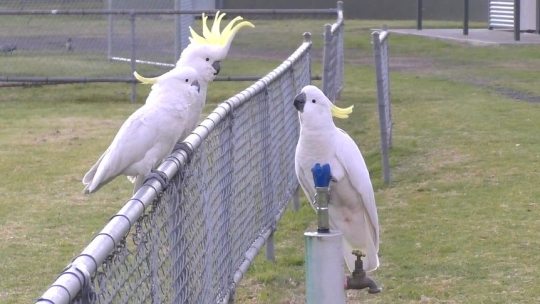
View On WordPress
0 notes
Text
美食记之黄焖鸡爪
鸡爪,还有一个美称,凤爪。这种食物,喜欢它的人,喜欢得不得了;厌恶它的人,又厌恶得不得了。我呢,曾经是一个厌恶鸡爪的人。小时候的我地抗拒一切奇怪的食物,其中就包括鸡爪、鸡头、鸡脖、鸭脖、猪蹄、猪耳朵还有各式各样的动物内脏。 我开始喜欢鸡爪,还是在上大学以后。在同学的推荐下,我尝试了当时很流行的“泡椒凤爪”,那酸辣的味道,脆弹的口感,果然把我征服了。让我后悔,为什么这么晚才发现它的美味呢? 鸡爪的吃法有很多,除了市面上常见的塑料包装的泡椒凤爪外,还有卤鸡爪、烧鸡爪等形式。这些我都尝试过,美味不必多言。 我想说的是,前段时间在出差的路上,在一家不起眼的小店里吃到的“黄焖鸡爪”。我认为,那是我吃过的最好吃的鸡爪了! 黄焖这种做法,用酱油上色,用香料辅佐,用小火慢慢焖制,使食材充分吸收入味,同时还能保持软嫩的口感。在中国,“黄焖鸡米饭”是广受大众喜爱的餐食。 我们去的那家饭店,位于国道…
0 notes
Text
2024"中国高被引学者"数学学科榜单
2024 Most Cited Chinese Researchers 姓名机构范猛东北师范大学滕志东新疆大学包刚浙江大学孙元功济南大学肖燕妮西安交通大学陈兴江南大学陈凤德福州大学何银年西安交通大学刘玉荣扬州大学丘成栋清华大学施保昌华中科技大学魏益民复旦大学王稳地西南大学王金亮天津工业大学杨晓松华中科技大学白占兵山东科技大学曹进德东南大学郭上江中国地质大学(武汉)黄飞敏中国科学院KHAN,ZAFAR HAYAT南宁师范大学李传东西南大学刘艳军辽宁工业大学刘红军济南大学李元新辽宁工业大学廖波海南师范大学彭实戈山东大学祁锋天津工业大学孙志忠东南大学唐春雷西南大学王焕清渤海大学吴国成重庆邮电大学王卿文上海大学徐昌进贵州财经大学徐瑞山西大学周炜星华东理工大学张彬林山东科技大学庾建设广州大学褚玉明湖州师范学院闫振亚中国科学院ALEXANDER KURGANOV南方科技大学白中治中国科学院BING…
0 notes
Text
耽美小说推荐1
耽美小说推荐1 干爹 香小陌--完。123。勉强看完。部分肉文。剧情一般。 替身男配只想赚钱 时今 --完,307,太好看入神,凌晨看书一小时仿佛一秒。五年慢恋爱。 男优秘辛_红糖/袖刀---完。92。赞51502。演有爱性爱。男明星黄片男主。刚开始恶心,剧情简单能看。 总裁的逃跑助理 芍妖---k103。文笔好。np.助理陪睡。被调教拍卖。道德污点。委屈求全.傻白甜求虐,没本事充老大受刑连带爱人。没能力自尊心重,所有爱人遭殃。 顾先生的小替身 海鸥岛---完。k85. 132人评1.2。文笔好,情节俗套。傻子舔狗。往上送群奸加虐待。被几个用人虐待。白月光绿茶。怀别人种。被拐卖被多人强暴。生死火海,不破不立,放手。家人。幸福。平静相守。 白骨观 木三观---完。92。太好看,几个小时停不下来,没废话。情深。 我做情感直播后爆红了 赢辞---完。148。非常好看停不下来,各种人生翻车。如活菩萨让人觉醒。破案。求生。 替身他修无情道 若兰之华---70人3.5。太好看了停不下来,有哲理深度愉悦。剧情完整,人物构建好。类似一十四洲的无情道和小凤凰,但有自己的故事。真的好看。文字短内容充实。虐文。
贵族男校 郑九煞--完。86。好看。喜欢就要。 财神在身边 金家懒洋洋---完。134。人间八苦。福星财星入世。套娃世界带暗码。蛮好看的。 复刻情人 clockwork---完。28。4人5。肉文,文笔差。十年后重逢。 空花阳焰 空菊---完。60。感情戏写的好。好看。合租三月再重逢。 婚约 漫漫何其多--完。k64.双暗恋,无脑甜文。能看。 被迫深入 站着写文--完。k109.好看不停。两人一起拧巴写出来了。 全世界都在等我们分手 不是风动---完。233。好看不停。双替身,武将和天才。 替演 何暮楚---完。k147.情节还行。有心痛感觉。文字拖沓。尾太平常。 我躺平后被系统绑定了 贝林---k377.大体好看。后面尾巴啰嗦。关于气运哲理。 小祖宗,咱们复婚行吗 夜行---k105.俗套剧情,小三和兄弟坑害。文笔好感情能感动人心。好文。结局啰嗦。
月光遗落 问君几何--完。k103.很好看不停。感情很带入心被虐文笔好,身临其境。回忆衔接自然。 完美无缺 金刚圈--完。200。很好看不停。演员重生。 和塌房顶流结婚的日常 安日天---好看。看过。一群塌房的一起拍戏。距离产生美。一起经历,能克制是爱。 无所不能事务所 紫舞玥鸢--完。69。好看不停,文笔啰嗦,似童话。甜文。 调教成神 青书无忌--完。113。框架很好,细节粗。情节吸引我不停看下去,肉部分还行,矛盾的张力有发挥空间。人物多,特点不够鲜明。行文可更简洁。 总裁的逆袭 清逸自如--完。56.减肥。舔狗被欣赏。自卑和提拔,不对等。能看。陆有掌控。养成系。 天资愚钝 九月买的饼干--完。127,虐待私生子和光,重逢。养成系。越爱分开越伤,为一人弃所有。送菊花。偏执爱。文笔很差。爱让悲惨人生。 我在娱乐圈搞科普 诺米莉亚--k17.无聊文。小时认识。谣言退圈。 野兽的魔法师 衣落成火--完,215,好看,晚上到凌晨连看五小时不停。野兽的觉醒,魔法师认知高,背对背,收获友谊和信仰。 失忆后和豪门前任联姻了 晴叶有枝--完,48,大学相恋白月光失忆重逢。住工作一起。相爱复合。能看甜文。 钓系美人装乖指南 甘洄--勾引继母儿子再离开。
阻止替身上位的一百种方法 裁影--k137.好看。不真实,同样人穿几个故事,以为有策略实则耍白痴读者。作者文笔极差没感情,剧情硬穿。 天才在左疯子在右 高铭--完,51,偏执,入魔,灵魂被吃,悟道误区,显摆成精神病,妄想症。有部分参考。 沉舟 楚寒衣青--完。k304。政治猎人猎物设局被套。好看不停,描写废话多,剧情,主角纠结真爱救赎。 天涯客 priest--完,52,很好看不停,立意比电视剧山河令高。两人都是高处看破遇知己。钥匙粉碎纷争与我无关。 杀破狼 priest--完,232,很好看不停,政治民情,人性,和中国政治有点像。作者能看清局势体察人心格局谋局。 锦瑟 priest--完。49,还行。priest文笔不好,写的很复杂,文字可读性差,一句话写几百句如同AI写的,情节还行。字多意少。缺人性。和情感。负面压制。 网恋翻车指南 酱子贝--完,354,校友加游戏搭子,掉马甲,精彩处在300章因初始不良用心被误会,感情真,坚心。甜爽文,单纯恋爱脑。勇敢追爱,男男直接不拧巴。 青越观 因倪--完,299,非常好看。有哲理有情,强强有人性。国内到国外,从人与人斗到人与天斗。 嫁入豪门的男人 血血--完。191.无脑爽文。无缘无故迷恋。太顺了不合逻辑。傻白甜和全力支持。甜,好看可爱。 大哥 priest--完,147,很好看不停,父母死13岁养两个5岁孩子,求生,不管穷富救济身边人,不断失去坚持抗争,感情亲情。剧情好,文笔罗嗦。
庶子生存指南制香 满地梨花雪--完,83,好看不停。励志,犯错的也有改过机会。有心机有情义。 贫穷但美丽的万人迷 啾咪啾咪兔--完。k61。小孩无聊文。太弱被对方操控。好看。终于找到爱。
1 note
·
View note